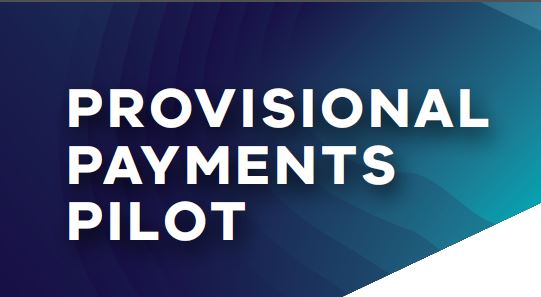
HomePage Featured (482)
The Mental Health Matters one-day program, hosted by ESF with support from the State Government, will bring together volunteers from across Victoria’s emergency service sector to discuss how we can better promote and support good mental health in an emergency services environment.
The workshops will be facilitated by experienced mental health professionals from OzHelp , alongside guests who will share their lived experience of working in the emergency services sector.
The one-day event is designed to provide participants with a deeper understanding of the many factors that influence our mental health and wellbeing; educating on how to apply these learnings in caring for ourselves and our colleagues in a volunteer team environment.
Participants will leave the workshops:
• Knowing the role of leaders [formal and informal] to support the mental health and wellbeing of a team
• Able to recognise factors which contribute to stress in a workplace
• Able to recognise early indicators of distress in themselves
• Able to recognise early indicators of distress in colleagues
• Confident in being able to start conversations about mental health and wellbeing with colleagues
• Knowing where to access mental health support and resources
Workshops will take place as follows:
Saturday 17 April – Ballarat
Sunday 18 April – City of Melton
Saturday 1 May – Bendigo
Sunday 2 May – Horsham
Saturday 8 May – Wodonga
Sunday 9 May – Seymour
Saturday 15 May – Warrnambool
Sunday 16 May – Geelong
Saturday 22 May – Lilydale
Sunday 23 May – Frankston
Saturday 29 May – Bairnsdale
Sunday 30 May – Traralgon
Register by going to the Emergency Service Foundation website.
VFBV Media Release - March 2021
Volunteer fire fighting in the Hamilton and Dunkeld regions has lost one of its most dedicated supporters in Leighton Wraith but his legacy will live on.
Mr Wraith, the driving force behind the volunteer-run Hamilton CFA-EMV Air Base and a CFA volunteer for more than 40 years, has died at his home near Dunkeld, aged 81.
Earlier this year Mr Wraith was awarded an Australian Fire Service Medal (AFSM) to recognise his long and outstanding service to CFA and his local community. His contribution will be remembered with plans to name a loading facility at the airbase in his honour.
Mr Wraith, a farmer and licenced pilot, was a volunteer with Bochara and Dunkeld Fire Brigades for 40 years and more recently led the Hamilton CFA-EMV Air Base.
Long-time friend Don Robertson said that Mr Wraith had been a major contributor to the region over many years, highlighted by his efforts to establish and maintain the air base.
Mr Robertson, a former shire councillor and mayor, CFA Board member and Volunteer Fire Brigades Victoria (VFBV) district chair, accompanied Mr Wraith to Canberra and Melbourne to campaign for the base.
“Without Leighton, we wouldn’t have an air base here,” he said. “It wasn’t really a shire issue, but we could all see the need for it.”
CFA District 5 Airbase commander Brett Gladki said the decision to name the loading facility in honour of Mr Wraith was driven by his fellow volunteers and recognised his dedication to the facility.
“Leighton lobbied very hard to get this new loading facility which runs like a well-oiled machine,” Mr Gladki said. “Previously the gear and the operators were exposed to the elements but this encloses everything and makes the whole process of loading aircraft more efficient and more comfortable.”
Mr Gladki said naming the loading facility in honour of Leighton recognised his dedication to the airbase. “He really drove this project and was the number one person in getting it off the ground,” he said.
“The naming is very much driven by Leighton’s peers at the airbase and the volunteers who spent many years working with him.”
A sign is being created and will be unveiled at a later date.
Volunteer Fire Brigades Victoria (VFBV) CEO Adam Barnett said Mr Wraith’s commitment showed how CFA volunteers could contribute in different ways at different stages of their lives and the facility naming was well deserved.
“Leighton’s dedication over 40 years with his local brigades and then with the air base was of huge benefit to his community and the region and he will be sadly missed. We pass on our best wishes to his family, friends and loved ones.
“Leighton has left an incredibly powerful legacy. The work he has done has saved countless lives and will continue to protect Victorians for decades to come.”
There are 15 other air bases in Victoria run by DELWP. Located at the Hamilton airport, the air base has 40 volunteers whose main tasks are to have water, foam or retardant ready and to load planes. They are usually needed about 30-40 times each summer.
Two bomber aircraft are permanently based at Hamilton over summer, plus two support aircraft, and the base has access to bombers from Casterton and Stawell.
Volunteers come from different brigades around the Hamilton region, sometimes performing dual roles for their local brigade and the air base. Most are retired or mature-aged farmers. “We’re so lucky; whatever needs fixing they can do it,” Mr Wraith said in 2019. “These guys are old-fashioned farmers who can do anything and fix anything.”
Mr Wraith had been recruited about eight years ago by the regional CFA operations manager to find volunteers to set up the base which is primarily responsible for a 22,000 square kilometre region stretching from Peterborough and Warrnambool, to near Balmoral and Glenthompson.
Mr Wraith said in 2019 that many of the volunteers had been active firefighters for decades but no longer wanted to be in the field.
“They’ve had a lifetime on the back of a truck and in strike teams,” Mr Wraith said. “They’ve had enough of that but still want to be involved so this keeps them active and in the CFA. We firmly believe we are contributing to the bigger picture to protect not only our own patch but the whole of the west, south-west and north-west of Victoria.”
Pictured: Leighton Wraith is second from left with fellow volunteers at the Air Base in 2018.
Victoria's Emergency Management Volunteers contribute a conservative indicative value of $1.9 - $2.5 billion dollars of value to Victoria every year.
VFBV has worked tirelessly alongside our partners at the Victoria State Emergency Service Volunteer Association (VicSESVA), Ambulance Victoria, St John Ambulance, the Victorian Council of Churches Emergency Ministry and Emergency Management Victoria (EMV) to research and report on the value of Victoria's emergency management volunteers, volunteering and volunteerism. This project is referred in shorthand, as the 3V's. (Volunteers - Volunteering - Volunteerism.)
The 3V's project has involved exploring additional ways to analyse the value of Victoria’s emergency management volunteers, volunteering and volunteerism. It has provided a framework and model that illustrates various layers of value, and explores the breadth of that value at the local community level. It was sponsored by the Volunteer Consultative Forum (VCF) which VFBV is a founding member of, and worked with Lateral Economics to produce a fresh and original perspective to this unique task using fit for purpose logic, structure and evidence.
The full Final Report, and the Interim Report (published in 2017) are both available for download at the bottom of this page.
The reports discuss the 'hidden value' that arises incidentally from the 3Vs that might not otherwise be known, captured and hence appreciated. It aims to bring this value to life through a new way of talking about volunteers, their activities and impact on society, while being accurate and credible.
The 3Vs Final Report presents a simple logic for how the 3Vs generate value to Victorians. Volunteers undertake activities which have positive outcomes or ‘value’, and value can be described in different ways. Describing value in its diversity allows the State to recognise and build on the value accrued by Victorian communities from the 3Vs. In this way, the 3Vs can be conceived not only as an emergency management workforce and a mechanism for building emergency related community resilience, but also as a way to strengthen communities.
Even a preliminary analysis of this kind shows that the value of volunteers is large, and widely distributed across the community. Discussing the size of the 3Vs’ value puts in stark contrast the flip-side of the issue: the possible losses and risk to Victoria from lower 3Vs activity.
VFBV commends these reports to not only volunteers themselves, but emergency management stakeholders, policy makers and the Victorian public in general.
Visible, active, positive emergency volunteerism in a community can make a difference to society as a whole. This difference has both tangible and intangible aspects. Emergency Management Volunteers are fundamental to emergency management in Victoria. It is therefore critical that their value and importance be recognized, and their collective interests and needs be protected, encouraged and supported to ensure they can deliver their services safely and effectively for the benefit of the Australian community.
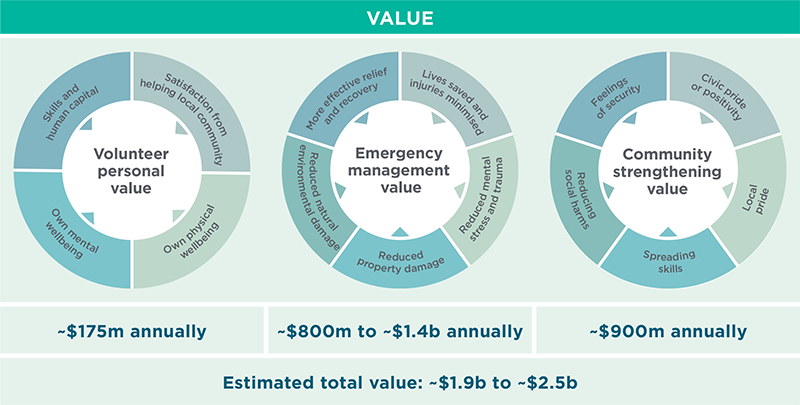
Excerpts from the reports:
3Vs - Volunteers, Volunteering and Volunteerism
It is estimated that approximately 100,000 Victorians contribute their time, skills and resources to ongoing volunteer work in local communities before, during and after emergencies. While it is helpful to know how many people volunteer, it provides no real insight, evidence or facts about the value that volunteers are providing to the state of Victoria.
The 3V’s Final Report: Uncovering the hidden value was developed by the Volunteer Consultative Forum (VCF) and supported by Emergency Management Victoria (EMV) to bring to life the value of the three V’s associated with volunteering within emergency services: volunteers, volunteering and volunteerism. This final report builds on the 3V’s interim report released in August 2017 and provides further evidence of the value generated by Victoria’s emergency management volunteers, volunteering and volunteerism and also a framework and model that identifies three layers of value: volunteer personal value; emergency management value; and community strengthening value. Both the final report and the interim report are available for download at the bottom of this page.
The value created by Victoria’s emergency volunteers, volunteering and volunteering is estimated at between $1.9 billion to $2.5 billion annually.
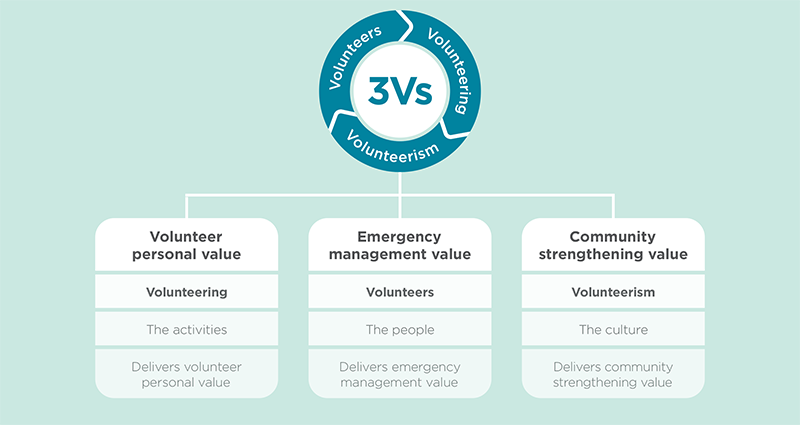
Defining the value
The 3V’s project developed a simple logic to explain how the 3V’s generate value to the Victorian community.

Where resources and inputs can include time, established working relationships, local knowledge, accrued skills and physical capability. Each of these are applied to undertake activities and outputs. These activities and outputs can be defined both in terms of emergency management, for example training sessions, responding to incidents, community safety, and in more general ways such as bringing a group together to work cooperatively towards a shared goal.
Activities and outputs have a positive outcome on someone or something which can define the value of the activity, this value can vary significantly in size depending on what would have otherwise occurred if not for the volunteer having input into the situation.
The Interim Report identified six types of value alongside the economic value that is often captured or referred to, each of these values span a wide range of beneficiaries and contribute to community resilience, the six types of value are:
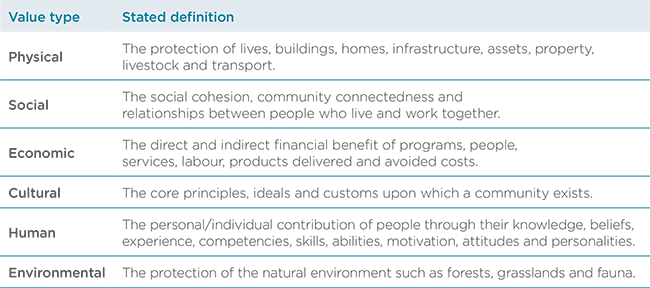
Each of these values aligns with one or more of the three concurrent layers of volunteering identified by the 3V’s Project, the three layers are briefly explained further below and more detailed explanations of the values can be found in the report available for download at the bottom of this page.
1. Volunteer Personal Value
The volunteer personal value refers to volunteering as the activity itself, the work that volunteers are doing before, during and after emergencies.
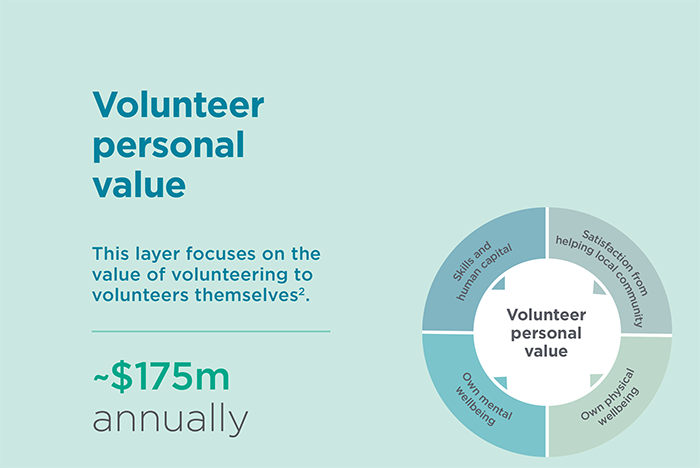
2. Emergency Management Value
The emergency management value layer refers to the volunteers who are the dedicated people who do the work in local communities before, during and after emergencies.
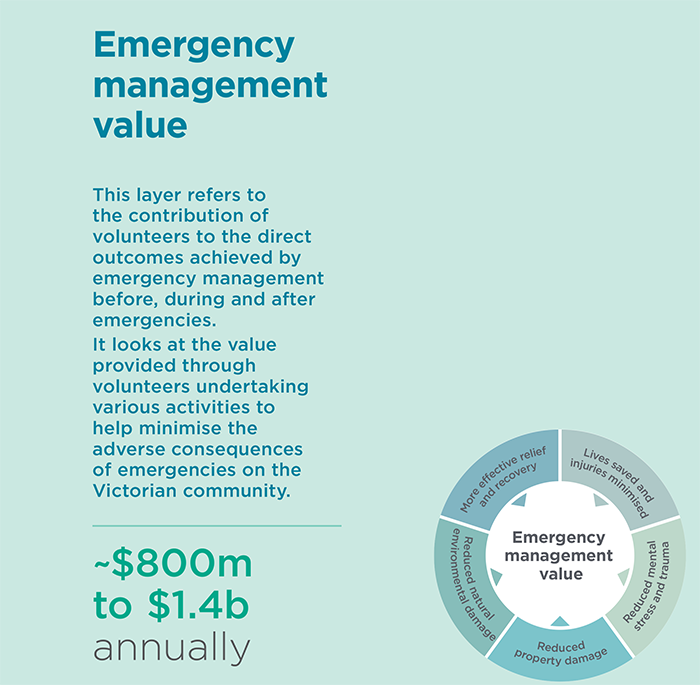
3. Community Strengthening Value
This layer relates to the value that the culture within the organisations and the culture within the community that volunteers provide value to, communities may feel a greater sense of safety and security knowing that volunteers are ready and able to assist.
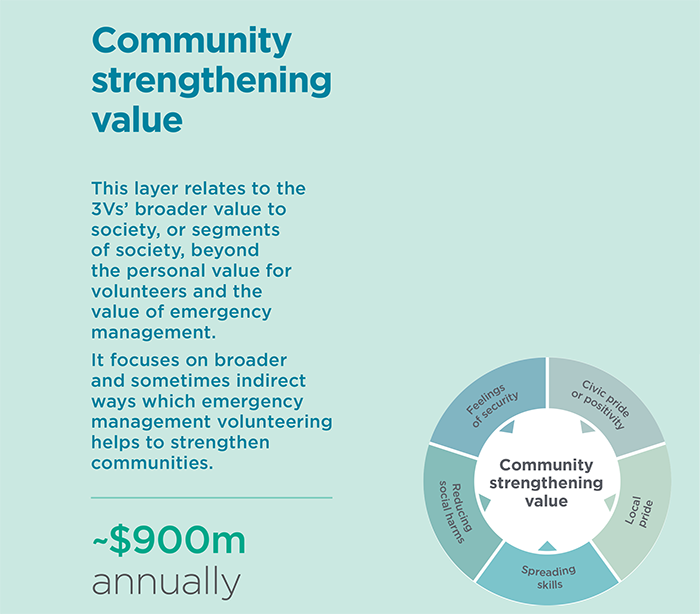
The 2017 Interim report also explored the characteristics of resilience, and produced the conceptual model below to illustrate the links between them:
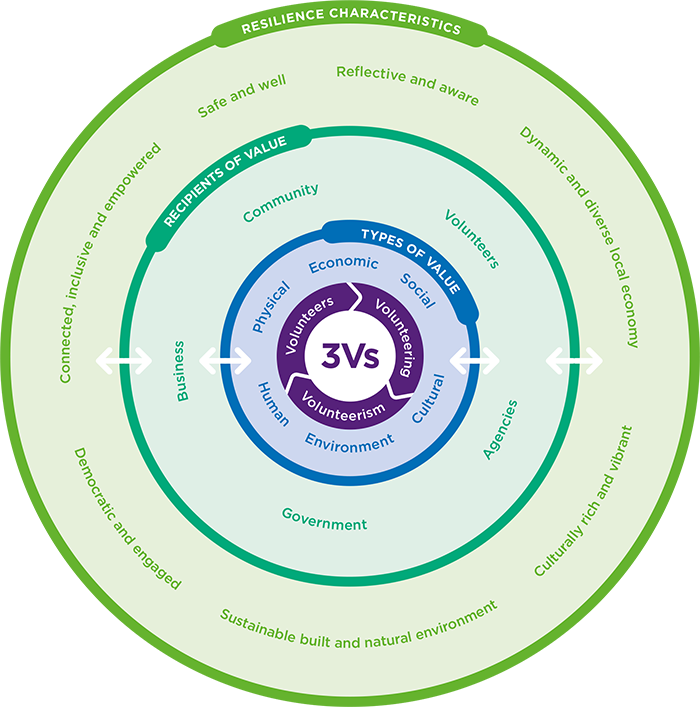
There is much to be proud of when presenting the value of 100,000 emergency management volunteers, the activities they provide and the spirit in which they work with and on behalf of Victorian communities.
Volunteers require respect, recognition and a purpose for them to continue to be engaged. Training, volunteer support and operational utilisation are also critical factors in retaining them and maintaining operational readiness for deployment.
Historical evidence demonstrates that when volunteer roles are diminished or they feel their contribution is no longer valued or respected, they disengage.
A cradle to grave volunteer model ensures flexibility to account for changes in lifestyle and career/family changes, or life pressures such as starting a family or new business. A flexible model that buffers this ebb and flow of availability is key to its long-term success and sustainability.
Recruitment, retention and respect go hand in hand with ensuring Victoria has a volunteer pool strong and resilient enough to meet future peak load demands. Volunteers must have meaningful roles to motivate and encourage them.
All recent inquiries and commissions have recognised the fundamental importance of the current volunteer arrangements. The need for trained, experienced volunteers is growing. Already one of the most wildfire prone areas in the world, Victoria faces the twin challenges of a rapidly growing population and increased urbanisation within an expanding metropolitan Melbourne and regional cities.
Volunteers are calling for bi-partisan support for initiatives that protect, encourage, support and strengthen Victoria’s emergency management volunteer surge capacity to best prepare Victoria for future disasters.
VFBV commends the 3V reports to not only volunteers themselves, but emergency management stakeholders, policy makers and the Victorian public in general and encourages you to read and explore the contents contains within.
Strong Volunteerism, Embraced to Build Community Resilience for a Safer Victoria.
This International Women’s Day, VFBV wants to celebrate the women who contribute so much to VFBV, CFA, emergency services and their communities.
The theme for International Women’s Day in 2021 is “Choose to Challenge” – where a challenged world is an alert world, and from challenge comes change. Each day the more than 12,000 female CFA volunteers challenge the stereotype of what a firefighter is and how women can be involved in any and all emergency services, while also leading the way for future generations.
Thank you for today and every day to all the fabulous, dedicated, highly skilled and much appreciated women in the CFA and across all fire and emergency services.
Lets all work together to encourage women challenge what it means to be a volunteer with CFA, together we can all make a difference.
About International Women’s Day
International Women’s Day is celebrated each year on March 8, it is a global celebration of the social, economic, cultural and political achievements of women while also being a call to action for accelerating gender parity.
The first International Women’s Day gathering occurred in 1911, you can read more about the history of International Women’s Day on the International Women’s Day website.
IGEM Fire Season Inquiry Community Meetings Postponed
Written by VFBVThe Inspector-General for Emergency Management has advised that they will be postponing the following Victorian Fire Season Inquiry community meetings scheduled for 15–17 February in accordance with today’s (12 February 2021) statement from the Premier:
- Orbost - Monday 15 February, 6.00pm
- Orbost - Tuesday 16 February, 10.00am - Small business owners/operators
- Cabbage Tree Creek - Tuesday 16 February 1.00pm
- Mallacoota - Tuesday 16 February, 6.00pm
- Genoa - Wednesday 17 February, 10.00am
-Wairewa - Wednesday 17 February, 2.30pm
The decision to postpone these meetings was difficult but reflects the advice of public health experts, that the whole of Victoria will move to ‘circuit-breaker action’ from 11:59pm tonight until 11:59pm on Wednesday, 17 February.
The Inspector-General will do everything possible to make alternative arrangements for these six community meetings and details once available will be made accessible through our website www.igem.vic.gov.au, and promoted through, Facebook (@IGEMVictoria) and Twitter (@IGEM_Vic).
For health information and further information about the ‘circuit breaker action’ please visit this website https://www.dhhs.vic.gov.au/coronavirus
Photo: Growing Back East Gippsland
Prep to Grade 6 Lakes Entrance Primary School
"Students from Prep to Grade 6 completed their own piece of artwork and collated them all into a collaborative piece. We chose a rainbow to represent the hope we share of our region gaining back its strength in all the areas we have had loss."
Tapping into our pioneering spirit
By Adam Barnett, VFBV Chief Executive Officer
Thank-you to all members who participated in our most recent annual VFBV Volunteer Welfare and Efficiency Survey.
The survey officially closed last month, and with well over 2,500 CFA volunteers participating, and over 5,500 fire service volunteers Australia wide - the survey remains one of the highest and most reliable samples of volunteer emergency service opinion and satisfaction metrics in the country.
And while analysis has only just commenced - sadly - early results indicate a continued decline in CFA volunteer satisfaction across several key areas.
The worst two performing areas contributing the most to volunteer dissatisfaction are again volunteer consultation (or the lack thereof) and training.
One of the early take-aways from the initial analysis is to consider that at the time of the survey, fire services reform implementation was about halfway through its first year and there had been significant promotion of a renewed focus by CFA leadership on the importance of volunteer engagement and consultation. And while this work may have only just started and therefore you would not expect it to significantly affect this year’s results, I would urge decision makers to reflect on the absence of any apparent ‘placebo’ affect whatsoever.
As expected, “reform” and the new arrangements have most certainly not provided a silver bullet, magic pudding or any discernible ‘honeymoon’ period thus far.
This confirms our experience that volunteers are tuning out the rhetoric and are looking for real and tangible outcomes that are proof of change, not just promises of change.
In many people’s minds - deeds and actions are worth more than all the words in the land. That’s not to say we shouldn’t keep trying but this should act as a sobering reminder that the road to change will be measured by the mile, not the inch and there are rarely any shortcuts.
Anyone who has been involved in change management would have come across the mantra espoused by management consultants inc. who love to sell the allure of ‘low hanging fruit’. The theory being that a quick SWOT analysis of any problem will normally reveal some quick wins that promises quick and easy gains for very little effort while you work on the longer-term changes.
As I remarked to an earlier CFA CEO some time ago now – you can forget that snake oil. Previous leadership picked the low hanging fruit years ago, and the orchard is now bare. You’ll be lucky to find a branch let alone some fruit. There is no low hanging fruit left. Nadda, zero, zilch. Grab a ladder, roll up your sleeves and be prepared to work hard for next seasons harvest team.
Now speaking of hard work, I want to publicly acknowledge the efforts of new Chief Officer Jason Heffernan who has certainly hit the ground running.
Jason has bought a renewed passion, perspective and enthusiasm to the Chiefs office, with a healthy dose of active questioning about “why do we do it this way?” Similarly, he has prioritised talking and engaging with volunteers in the field and hearing from us firsthand about the volunteer experience of CFA but equally important - listening to volunteers hopes, dreams and aspirations. His regional tours of brigades across the State continues, and from all reports - he is leaving a great first impression.
Volunteers have embraced his unapologetic support for the volunteer ethos and his strong advocacy for volunteer empowerment, trust and respect. He is equally assertive in recognising the vital role that CFA plays in communities right across Victoria.
I have been very pleased to observe the Chief referring collectively to ‘our’ CFA, quickly graduating from interstate visitor to stalwart defender and protector of one of Victoria’s most precious resources. Thank-you Chief, well done – and keep up the good work.
But equally - we as volunteers must also embrace the change journey if we have any hope of influencing it. As volunteers we are equally responsible for the organisation’s leadership and destiny. And for those fatigued by the change journey, the bitterness and many a false start, I would ask we reflect on the proud history of volunteers being the instigators and pioneers of constant positive change and evolution of our fire service over the years. For in many ways – volunteers are in fact leading the charge in demanding change to the organisation through their feedback. If the way things are done now is causing such widespread dissatisfaction -as it clearly is - then we must commit ourselves to a change journey of fixing it and getting behind that change.
We also must acknowledge that this is going to come very hard to those that have suffered what feels like endless change that has delivered very little tangible outcomes. Change for changes sake is no real change at all. And thought bubbles from on high will not cut it. Embracing volunteers, doing change with them instead of to them – and being respectful of the nuances required to cater to a volunteer-based organization and work force is critical. As is patience, empathy and some good old fashion decency in how people should be treated, embraced and included in discussions about what those changes should be.
Like an elastic band, CFA culture will resist any change that grass root members do not get behind and commit to. The politics of division that have played out of late should also be viewed as the aberration it is. The mantra of divide and conquer has no place in our organisation and is unworthy of the public good and service provided by CFA members and something we should play no part in.
So, the challenge for all of us is not to close ourselves off to all change but rather find a way to assess the potential pros and cons of proposed changes and then decide to either get behind it or not. We shouldn’t be afraid of driving our own change also. I know you are tired, and many of you tell me you are ‘over it’. But let us be the change we want to see. Let’s not resist for resistance sake, but by the same token, if we are not behind a proposed change or see a better way – we owe it to ourselves to speak out and contribute to the discussion.
There was a contribution from Fireman Sam in the October 2009 edition of The Fireman (Fire Wise) (no 862.) The article was titled ‘Cousin Fred’s Letter.’
Keeping in mind that CFA was still very raw after the events of Black Saturday back then, it is instructive of the kind of getting back to basics thinking that should form the genesis of any future CFA improvements. The article should be required reading for anyone in CFA that is contemplating change.
In it, Cousin Fred opines that volunteering is likely to be perceived by the next generation of volunteers as a mugs game. A couple of excerpts:
“However friendly and welcoming the local brigade may be – and I think they are generally warmly so – the recruit is confronted by an obstacle course of bureaucratic requirements and impediments. She or he joined for many and varied reasons, but they include learning a set of skills and applying them – preferably usefully and to somebody’s benefit.”
“They soon discover that most of a brigade’s business is rapid-fire exchange of paperwork with HQ, agonised head scratching about the actual meaning of directives from on high and means of complying with them but seldom any hint of why it should be so.”
“If they joined with any hope of making a difference, they soon realise that, for much of the time and in most of their CFA activities, they are small, insignificant cogs in some complex machine that works in a manner even more mysterious than that of the Almighty to perform wonders that are a public laughing matter and the butt of widespread derision.”
Cousin Fred then leaves little to the imagination in his assessment of management and CFA corporate and signs off as “not-very-cheerfully, Cousin Fred.”
The point of this is not to agonise over the organisation’s collective shortfalls but to reiterate and reinforce the blunt and sobering advice given to Cousin Fred. The gist was - don’t just write about it Fred – do something!
It is in this spirit that I want to thank every single person who has recently contributed and/or taken part in surveys, workshops, VFBV district council meeting discussions or made submissions to recent topics open for formal consultation. You have made a difference and your voice is not only being heard but is helping to shape the future.
For those who have not participated or taken part, please consider getting involved. The strength of CFA is the collective experience and wisdom that comes from within our volunteer ranks, and we have never needed you as much as we do now.
To quote Thomas J. Watson who served as Chair and CEO of IBM between 1914 – 1956 and who oversaw the company’s growth during the early computer revolution - “Once an organisation loses its spirit of pioneering and rests on its early work, its progress stops.”
We have much to be proud – but we can’t just stand still and opine for the ‘good ole days’. Please - stay connected, stay involved and help us continue to influence what comes next.
Fire Wise Publication – February 2021 Edition
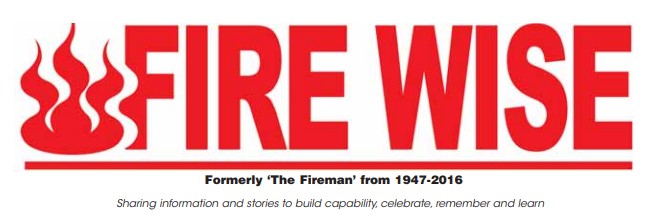
The February 2021 edition of Fire Wise has been published online only, this edition and past editions are available from the Fire Wise website.
You can support Fire Wise and the role it plays as an independent voice in keeping volunteers informed by becoming a subscriber. To become a Fire Wise subscriber visit the Fire Wise website or contact the Managing Editor of Fire Wise, Gordon Rippon-King either by phone 0402 051 412 or email This email address is being protected from spambots. You need JavaScript enabled to view it.
COVID-19 Portal
CFA has reported that the Pandemic Team continue to work towards a ‘roadmap to normal’ as brigades continue to train and meet under more relaxed protocols as part of the transition to COVID-normal.
It is important that as brigades begin to return to more traditional service delivery and brigade routine that they continue to wear masks indoors, regularly sanitise hands and adhere to social distancing rules.
With the recent outbreak of COVID-19 cases in NSW and recently here in Victoria it only highlights that no-one can be complacent when it comes to infection control.
Members are asked to be extremely vigilant in ensuring the correct COVID protocols are adhered to at all times. The CFA coronavirus online portal will continue to be updated as the situation changes.
Recent articles highlighted the magnificent work done by brigades to continue to service their communities during what has been very challenging times. The COVID Portal is available from: https://www.members.cfa.vic.gov.au/mycfa/Show?pageId=covid19
CFA announces new look workwear
VFBV has welcomed CFA’s announcement of progress on CFA workwear that was provided on the 20th January.
A total of $3 million in part funding for workwear was secured from the Victorian Government back in August 2017.
After many years of delays and external interference, VFBV has been campaigning hard to see this project delivered. The working party has worked in good faith with CFA during that period, providing input and ensuring volunteer feedback was constantly incorporated into CFA’s final designs.
In excess of 5,825 individual responses to surveys and requests for feedback have been considered by the working party demonstrating the interest and complexity in the design process.
Given the broad and diverse, and sometimes polar oppositive aspects of some of the feedback - this has been a challenging process, but also demonstrates the commitment to incorporate feedback.
And while CFA did not accept all of the working party’s recommendations, we are pleased that the final design represents a smart and professional look and honours the majority of feedback received from the thousands of volunteers who contributed to the discussions.
We are also appreciative of the CFA officers who assisted with this process and supported the working party with technical knowledge.
VFBV is continuing to advocate for additional funding to provide a more fair and equitable allocation across the State and we are seeking greater flexibility for brigade and group initial allocations to provide an opportunity for brigade/group management teams to have input into their respective allocations, as well as the ability for top-up orders.
Public tenders are currently underway, and we look forward to workwear rolling out later this year.
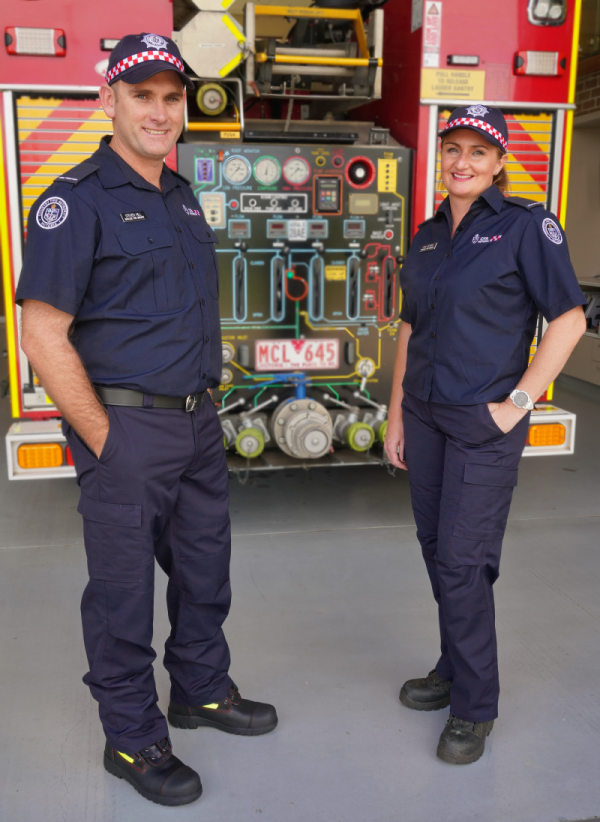
Pilot extended
VFBV welcomes the extension of the State Government’s Provisional Payment pilot, which has been extended to June 30th 2021.
The pilot program allows CFA volunteers to access reimbursement for medical treatment and services while their compensation claim is being assessed and for a period of up to 13 weeks in the event their claim is rejected. The pilot is being offered to not only CFA members, but Victoria Police, Ambulance Victoria, FRV, ESTA, DELWP and other emergency related public sector volunteers and employees including registered nurses.
Good engagement with VFBV and CFA volunteers was established early in the pilot with former Minister for Workplace Safety, the Hon. Jill Hennessy MP engaging with us early and encouraging our participation on the pilots steering group.
VFBV is represented on the Governments Pilot Steering Committee by CEO Adam Barnett who reports good progress with wide collaboration between the agencies, departments and stakeholders involved.
The intent of the pilot is to transition to permanent and ongoing arrangements with legislative changes currently before Parliament. VFBV is advocating strongly to government and CFA to ensure the same arrangements are mirrored in the CFA Regulations to ensure no gap in coverage for CFA volunteers covered by CFA volunteer compensation.
VFBV encourages any member who may be experiencing a mental health injury or trauma such as PTSD, depression or anxiety that has been caused by CFA service to make contact with the CFA wellbeing team on 1800-959-232, and consider accessing the provisional payments pilot. A claim form is available from your CFA District Office, and VFBV has requested the forms also be made available online. Any members having difficulty accessing the pilot should make contact with a VFBV State Councillor or Support Officer for priority assistance.
Further information on the pilot can be located on the VFBV website.

Structural Helmet safe stowage
The Joint Equipment & Infrastructure Committee has discussed the roll out of the new structural helmets which are nearing completion after experiencing many delays due to the COVID restrictions across the State.
During this time CFA Engineering continued to work on options for the safe stowage of the new structural helmets in appliances. Members would understand that this is a complicated process due to the many variants in CFA’s fleet of Tankers, Pumpers and specialist vehicles.
Priority is being given to the fitment of helmet stowage to appliances at Brigades that already have the Pacific F15 helmet. Helmet stowage for the remaining appliances is intended to be modified in parallel or ahead of the remaining roll out of helmets.
Some Brigades have been involved in testing brackets and bags and providing feedback to CFA for improvements. Consideration has prioritised passenger safety, accessibility, compliance with OH&S regulations and vehicle limitations.
The fleet of pumpers were fitted first with the light pumpers now being considered and a prototype bracket being designed for testing before final fitment is completed.
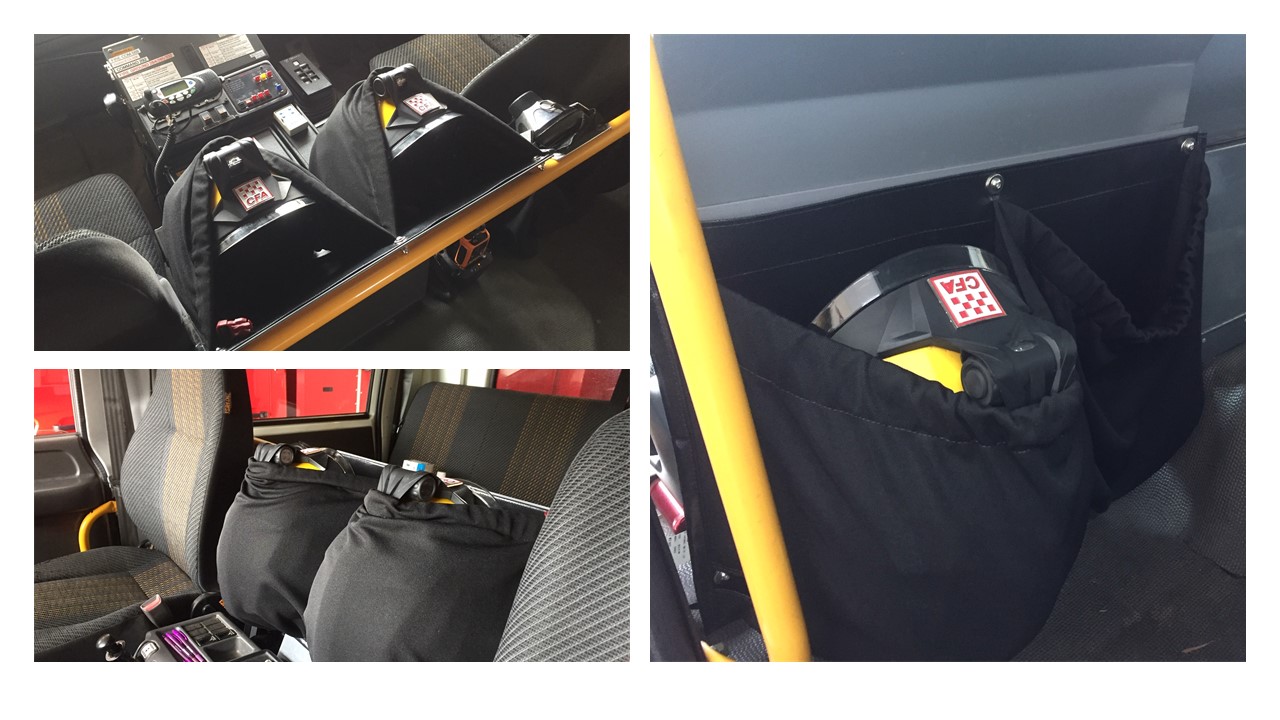
Ground observers for the future
VFBV is continuing its advocacy through the Joint VFBV/CFA Operations Committee on behalf of volunteers concerned there may not be sufficient volunteer Ground Observers for future fire seasons.
VFBV has highlighted the lack of pre-requisite training being provided and the lack of support to build this capability over recent years.
CFA has confirmed the volunteer capacity in the state’s ground-based Intelligence gathering (GIP) role has diminished over time.
Reports indicate that 229 ground observers have gone across to FRV with only 50 volunteer ground observers still remaining within CFA.
Discussions on a ground-based intelligence gathering plan are being discussed between CFA and Forest Fire Management Victoria.
The plan is considering an interoperable enhanced training package for sector commanders/ division commanders to ensure personnel have the experience and course prerequisites to competently deliver ground-based intelligence gathering.
The work will involve FFMV, SES and CFA to develop a joint ground-based intelligence gathering course for all incidents and sustain an increased capability for CFA volunteers to operate in this important field.
CFA will soon call for expressions of interest for volunteers who wish to train as a ground observer and have the required pre-requisites.
VFBV encourages volunteers to apply.
Australia Day Honours 2021
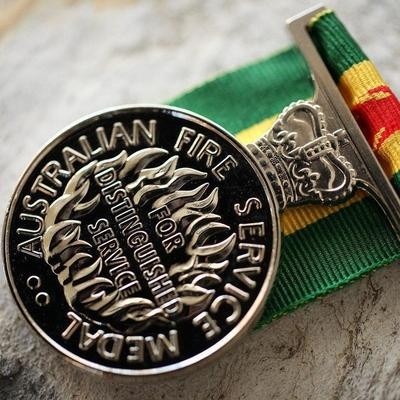
Included in the 2021 Australia Day Honours list announced on 26th January 2021 was five CFA members who were awarded the Australian Fire Services Medal (AFSM) in recognition of their contribution to the community.
VFBV congratulates Ross Coyle (Wodonga West Fire Brigade), Ian Hay (Gisborne Fire Brigade), Mark Roberts (Cobden Fire Brigade), Leighton Wraith (Dunkeld Fire Brigade) and Greg Leece (Ocean Grove Fire Brigade) for their outstanding contribution to CFA and the broader community.
You can read more about the CFA members awarded the Australian Fire Service Medal on our website.
2021 State Championship Entries
Entries for all of the State Championships at Mooroopna in March are still coming, with entry numbers currently:
| Urban Juniors: 41 team | Urban Seniors: 39 teams |
| Rural Juniors: 32 teams | Rural Seniors: 48 teams |
VFBV strongly encourages brigades and teams who have not yet entered to consider competing at any of this year's State Championships (dates listed below).
Members can register online to request relevant entry forms to be emailed to them for completion and submission. For any queries in regard to entering, or for assistance with the online forms, please contact Jenni at the VFBV office either by email This email address is being protected from spambots. You need JavaScript enabled to view it. or the call the VFBV office on 03 9886 1141.
2021 State Championship Dates
Urban Juniors: Mooroopna, 20 and 21 March 2021
Urban Seniors: Mooroopna, 27 and 28 March 2021
Rural Seniors: Mooroopna, 27 March 2021
Rural Juniors: Mooroopna, 28 March 2021
Enjoy the VFBV monthly newsletter?
If you enjoy reading the VFBV newsletter each month, why not share it with your fellow volunteers?
Either share this page with others who may enjoy the articles or encourage other volunteers to sign up to receive their own copy each month here.
Mental health support is available for CFA volunteers and other Victorian emergency workers
Written by VFBVIf you have a work-related mental health injury, it’s important to get treatment early.
The Provisional Payment pilot allows CFA volunteers and other emergency services workers to access payments for mental health support while their Work Cover or CFA Volunteer compensation claim is being determined.
The pilot is available to eligible former and current emergency workers (including employees and volunteers) who have submitted a compensation claim to their agency for a mental health injury. It covers all reasonable medical treatment and services for related mental health injuries over a continuous 13-week period.
This may include visits to your general practitioner (GP), the cost of prescription medication, and visits to mental health professionals such as psychologists or psychiatrists.
If you have recently submitted a claim or are intending to, you should speak to your employer or volunteer agency about whether you are eligible to participate in the pilot.
If your claim is rejected, you will continue to receive payments for up to 13 weeks from the date your claim was submitted.
To find out more information about the pilot, visit https: https://www.vic.gov.au/provisional-payments
Further mental health support services:
Beyond Blue
Depression and anxiety support
1300 224 636
Phoenix Australia
Centre for Posttraumatic Mental Health
03 9035 5599
Head to Health
https://headtohealth.gov.au/
Lifeline
13 11 14
VFBV welcomes the extension of the State Government’s Provisional Payment pilot, which has been extended to June 30th 2021.
The pilot program allows CFA volunteers to access reimbursement for medical treatment and services while their compensation claim is being assessed and for a period of upto 13 weeks in the event their claim is rejected. The pilot is being offered to not only CFA members, but Victoria Police, Ambulance Victoria, FRV, ESTA, DELWP and other emergency related public sector volunteers and employees including registered nurses.
Good engagement with VFBV and CFA volunteers was established early in the pilot with former Minister for Workplace Safety, the Hon. Jill Hennessy MP engaging with us early and encouraging our participation on the pilots steering group.
VFBV is represented on the Governments Pilot Steering Committee by CEO Adam Barnett who reports good progress with wide collaboration between the agencies, departments and stakeholders involved.
The intent of the pilot is to transition to permanent and ongoing arrangements with legislative changes currently before Parliament. VFBV is advocating strongly to government and CFA to ensure the same arrangements are mirrored in the CFA Regulations to ensure no gap in coverage for CFA volunteers covered by CFA volunteer compensation.
VFBV encourages any member who may be experiencing a mental health injury or trauma such as PTSD, depression or anxiety that has been caused by CFA service to make contact with the CFA wellbeing team on 1800-959-232, and consider accessing the provisional payments pilot. A claim form is available from your CFA District Office, and VFBV has requested the forms also be made available online. Any members having difficulty accessing the pilot should make contact with a VFBV State Councillor or Support Officer for priority assistance.
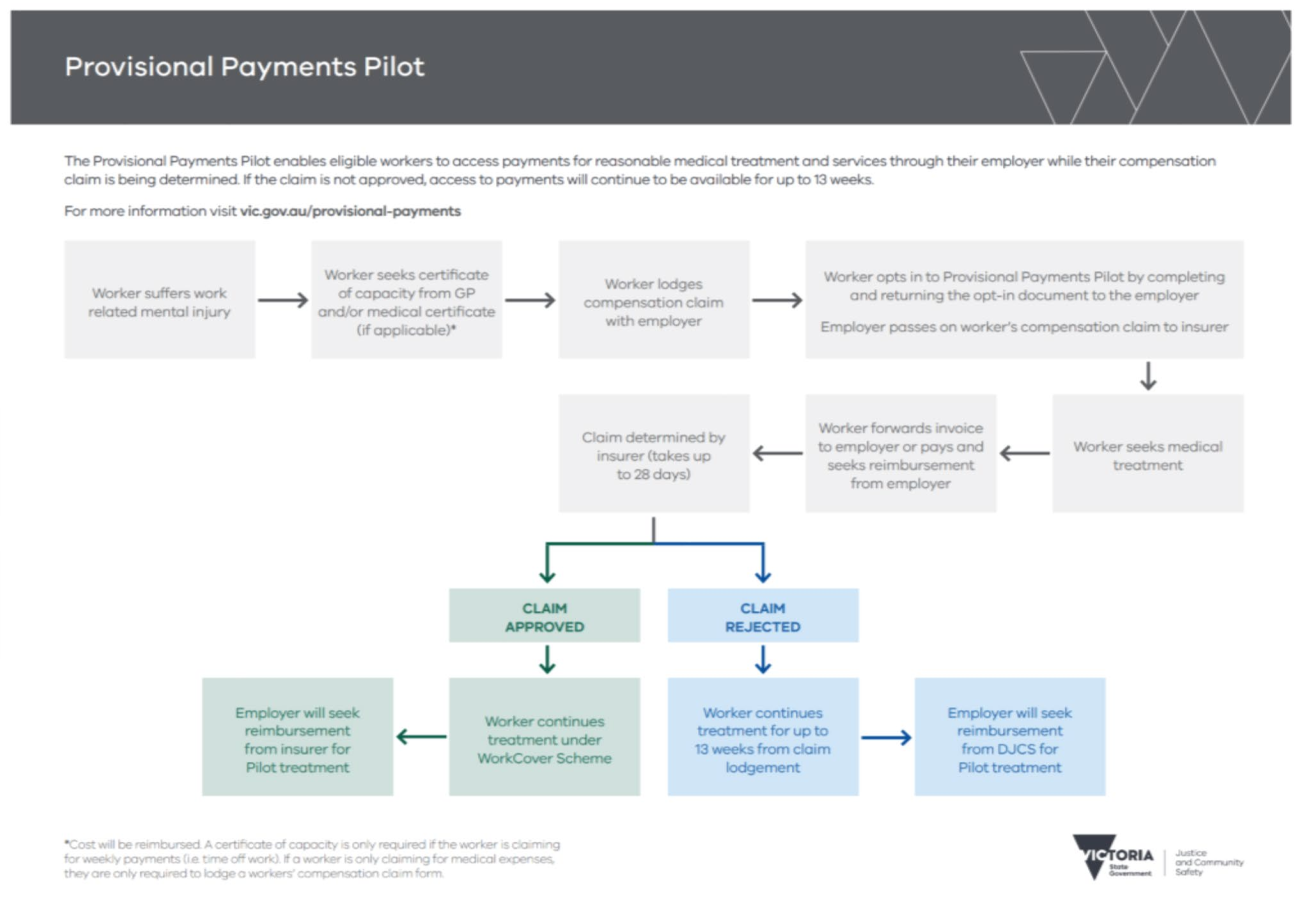
Included in the 2021 Australia Day Honours list announced on 26 January 2021 was five CFA members who were awarded the Australian Fire Services Medal (AFSM) in recognition of their contribution to the community.
VFBV congratulates these members for their outstanding contribution to CFA and the broader community.
Ross Coyle – Wodonga West Fire Brigade
Ross has been a CFA volunteer for 35 years first joining CFA as a junior. Ross has contributed to CFA in many ways, including as a volunteer nominee to the CFA Board from 2010 to 2016 which was a period of significant change for CFA. While a member of the CFA Board, Ross was a strong advocate for rural and growing regional communities and also chaired the Service Delivery Committee and the CFA Honours and Awards Committee. Ross has played a number of key operational leadership roles both at home in North East Victoria and on interstate strike teams, as well as serving as Captain of Wodonga West Fire Brigade for four years. You can read more about Ross’ service here. https://news.cfa.vic.gov.au/-/dedicated-service-to-cfa-recognised-with-top-honour
Ian Hay – Gisborne Fire Brigade
Ian joined CFA in 1975 as a volunteer with the Bullengarook Fire Brigade and later transferred to Gisborne Fire Brigade. During his time with CFA, Ian has held roles such as Group Officer for the Mount Macedon Group, Group Communications Officer and Brigade Secretary as well as being a Level 2 Incident Controller, a Level 3 Operations Officer and a Divisional and Sector Commander. You can read more about Ian’s service here. https://news.cfa.vic.gov.au/-/high-honours-for-gisborne-firey
Mark Roberts – Cobden Fire Brigade
Mark has been a member of the Cobden Fire Brigade for 30 years, first joining as a member of the junior running team. Since then Mark has progressed through the ranks taking on a number of roles including coaching juniors who are now coming through the ranks of his brigade and has also been the Group Officer for the Cobden Group since 2007. Mark has been an outstanding operational leader who has contributed to CFA and his community over many years, including during the aftermath of the St Patrick’s Day Fires in 2018 . You can read more about Mark’s service here. https://news.cfa.vic.gov.au/-/community-hero-honoured-with-afsm
Leighton Wraith – Dunkeld Fire Brigade
Leighton’s volunteering with CFA has taken place over the last forty years in the South West of Victoria, particularly with the Bochara and Dunkeld Fire Brigades. Leighton has been integral in the establishment of the Hamilton CFA-EMV Air Base and its facilities which took over seven years to complete while also recruiting over 40 volunteers to take on roles at the air base. You can read more about Leighton’s service here. https://news.cfa.vic.gov.au/-/aviation-hero-receives-prestigious-award
Greg Leece – Ocean Grove Fire Brigade
While Greg's AFSM was awarded through the Department of Environment, Land, Water and Planning, Greg has been a dedicated CFA volunteer concurrently with CFA for over 40 years. Greg’s AFSM acknowledges his distinguished service with both the Department of Environment, Land, Water and Planning as a prescribed firefighter and his service as a CFA volunteer of over 40 years, initially with the Seymour Fire Brigade and currently with the Ocean Grove Fire Brigade. Greg has been a strong leader in fire planning across Victoria and has been actively involved in refining and improving the Incident Shift Plan templates to make them more fit for purpose.
VFBV congratulates these five CFA members for their outstanding contribution to CFA and the broader community along with all other Australians recognised in the Australia Day Honours this year.
Other Victorian firefighters to receive the Australian Fire Service Medal honour on Australia Day were:
- Brendan Angwin – Fire Rescue Victoria
- Craig Brownlie – Fire Rescue Victoria
- Jonathon Gwilt – Parks Victoria
- Kevin Legge – Department of Environment, Land, Water and Planning
VFBV congratulates these fellow fire service members for their outstanding contribution to the state of Victoria.
Nominations for AFSM's
Nominations for AFSM's are accepted at any time through CFA's Honours and Awards Committee.
The AFSM honours the distinguished service of members of fire services who make an exceptionable contribution to their communities. The AFSM recognises those whose service is above and beyond the normal zealous and faithful discharge of normal or ordinary service, either in the short or long term.
CFA volunteers are often modest and reluctant to seek out recognition for the service they have provided to their community and may not have a realistic appreciation of the impact they have had on CFA, their community, within VFBV or your Brigade or Group. They’re not in it for the honour or glory, but it’s up to each of us to ensure we take the time to say ‘thank-you’ to those people who have stepped up and help inspire us all to do better.
If you know a quiet achiever who has contributed to CFA, who goes above and beyond what could be reasonably expected of someone in a similar position, please consider nominating them for an AFSM.
The Australian Honours system has been designed to break down artificial barriers and open the Australian Honours to all parts of our society. Any member of the community can nominate any other Australian citizen for an award.
It is also critically important we encourage nominations for groups who are typically under-represented in Australian Honours like the AFSM. In particular we are encouraging a greater gender mix.
Women in particular are under-represented in AFSM’s awarded when we consider the thousands of women within the fire services across the country. And while things are improving, much more can be done.
There are so many exceptional CFA women and men deserving to be recognised, so please consider nominating someone you feel is deserving.
A common misconception is that only those members who have decades worth of service are recognised by the Honours system. The AFSM is not a long-service award, its sole criterion is distinguished service. And while prolonged service forms part of the key criteria, ‘prolonged’ is considered by the honour and awards committee’s to be taken in context as to what is considered ‘longer than usual’ and in context of what is ‘above and beyond’ the normal or ordinary service expected. Exceptional service that is sustained over a period of time can be considered as satisfying the criteria. For example, has the members contribution been in excess of expectations for a ‘normal’ member and over what duration? The Committee will consider the nature of the service or achievement within the context of a member’s service history when weighing up the various criteria.
This is especially important for women within CFA who may have their service overlooked simply because they haven’t been a Captain or Group Officer for 30+ years. While these are important leadership roles – our service is a team environment, and everyone’s contribution is valued.
Nothing should take away from the incredible achievement decade long service is, but the Honours system is designed to recognise those that make a significant contribution, and to represent the things that our communities believe to be deserving of recognition, including from those who are perhaps trailblazers for others to follow. Think of those people who have pushed the boundaries or have been first to reach and hold leadership positions that has been inspirational to those around them. For example, think of members who have overcome additional barriers, like English not being their first language and who have toiled away to learn the language and become masterful communicators designing new innovative community safety engagements to CALD communities and serving as a role model for other community members. Who are the people you look up to? Who are the people who have really made a difference in your Brigade or Group?
Distinguished service includes service that is above and beyond and can be short-term or prolonged. It is service that can be exemplified by; responsibility for an outstanding event that has proven to be of significant benefit to the fire service or community; development of a new system, procedure or technique that is unique and made a significant contribution to the fire service; or outstanding leadership in the encouragement and development of others, particularly youth within the fire services.
While it can seem daunting to nominate a potential recipient, some guiding principles that could assist in completing a nomination for an AFSM are:
- In what role(s) has the nominee excelled?
- How has the nominee demonstrated service worthy of recognition?
- How has the nominee’s contribution affected a particular field, locality, brigade, group or community at large?
- Over what period has the nominee made a major commitment?
- Has the nominee’s contribution been recognised elsewhere?
- What makes this person stand out from others?
- What specific examples can be provided to show how the nominee’s contribution(s) have been outstanding?
Nominations for awards are strictly confidential. The person being nominated should not be approached for information or advised of the confidential nomination at any stage of the process.
Additional Resources to Assisit
Guide to Preparing Nominations for the Australian Fire Service Medal (AFSM)
Want to discuss a potential nomination or need some more information? Contact This email address is being protected from spambots. You need JavaScript enabled to view it.
About the Australian Fire Service Medal
Introduced in 1988, the Australian Fire Service Medal recognised distinguished service by members of Australian fire services and is awarded to both volunteer and paid members. The award recognised the distinguished service by members of a State or Territory Fire Service, a Fire Service of an agency of the Commonwealth, and the Fire Services of the External Territories of Christmas Island, Cocos (Keeling Island) and Norfolk Island.
The medal is awarded twice a year as part of the Australia Day award and Queen’s Birthday award announcements.
Criteria for the Australian Fire Service Medal
To be considered for this award it would be expected that the nominee has given service beyond the norm exemplified by:
- Prolonged service distinguished by exceptional performance in a particular area that has proved significant benefit to the fire service; and one or more of the following.
- Responsibility for and management of an outstanding/exceptional event that has proven to be of significant benefit to the fire service, a community or community safety generally.
- Development of a new system, or procedure, or technique that is unique and has made a significant contribution to the fire service, a community or community safety generally.
- Outstanding leadership in the encouragement and development of others, particularly youth, within the fire service and the fostering and furthering of the aims of the fire service to the long-term benefit of the fire service and the community.
- Demonstrated creativity in the development and implementation of innovative changes that have made a significant contribution to the fire service, fire/emergency operations, or the interests of community safety.
Black Summer recovery progress
By Adam Barnett, VFBV Chief Executive Officer
Welcome to a new year, and good riddance to the one just gone. I don’t think very many of us will look back on 2020 with much fondness.
And while the start of 2021 has bought back some familiar COVID-19 challenges - let’s hope the year ahead heralds the start of a rollout of an effective vaccine and the return to a relative ‘normal’.
Speaking of normal, I am relieved to observe a milder season than last year, which has certainly minimised fire activity so far. Thank-you to each and every one of you who have given up time with family, loved ones and friends during the Christmas and New Year break to respond to fires and incidents across your local communities.
And while many have been unable to travel due to border controls, it is a timely reminder that should you be planning to travel locally, you are encouraged to remember those towns that were heavily impacted by last season’s bushfires.
Please consider continuing to support these communities with your hard-earned tourist dollars should you be travelling within Victoria over the coming months. Supporting local businesses in these communities is a wonderful way to support their recovery and help them get back on their feet. And like those communities impacted by the Black Saturday fires of 2009, for many of these communities the road to recovery will take many, many years.
With the anniversary of last year’s Black Summer fires in mind, I wish to reflect on the work of VFBV and our delegates who have worked tirelessly with Brigades and members across the State but in particular the North East and South East of Victoria to support volunteers directly impacted by the 2019/20 Black Summer fires.
The VFBV Volunteer Support and Recovery Trust has been working alongside delegates and each of the VFBV District Councils over the last year to provide support and relief grants to those most heavily impacted and requiring additional support. As I said last year, we know from first hand experience that the journey back takes time, patience and understanding and we are committed to supporting our people for as long as it takes.
Immediately following the fires our Trust, in partnership with the VFBV Welfare Fund, provided over $133,000 in emergency grants to support CFA volunteers whose primary residence were destroyed by the fires. These grants help supported these members re-establish their homes or relocate should the memory of their loss be too great.
VFBV delegates were on the ground within days of the fires starting and these emergency grants and application process was streamlined and expedited so that support could be provided quickly and without fuss to help those volunteers who lost their primary residence from the fires.
Over the proceeding months, VFBV worked with Captains and Group Officers to identify and reach out to others impacted. This process was made much harder by the proceeding COVID lockdown and restrictions, but we determinedly pushed through and ensured these processes continued despite the COVID challenges.
Similar to the work we conducted following the Black Saturday fires, members were supported through two main special grant initiatives. High Impact Support grants were provided to support volunteers with repairs to their damaged residences, outbuildings, machinery and help members recover from significant livestock, feed or fencing losses.
And smaller general Support and Relief grants were provided to support volunteers with minor repairs or to help replace tools, equipment, pasture and smaller stretches of fencing.
And while this work continues, as at last month the VFBV Volunteer Support & Recovery Trust has paid out more than $255,500 in grants, on top of the $133,000 provided in emergency primary residence relief grants representing close to $400k in direct support to CFA volunteers arising from last season’s bushfires.
The Trust has now distributed over $1.1 million dollars since it was established just over 10 years ago following the Black Saturday bushfires. This is an incredible achievement and one members and delegates should be immensely proud.
And as with our Welfare Fund, we have maintained our legacy of ensuring 100% of the money we receive through donations to our charities remains in the trust and is used entirely for grants to volunteers. VFBV covers all the administration and expenses ensuring every dollar received by us is put to good use.
It goes without saying that the work of our Trust would not have been possible without the wonderful and generous support of our donors which also reached new levels during last season’s bushfires. The outpouring of support from the general public, international donors and corporate donors especially, was unprecedented. Thank-you also to those Brigades and individuals who made donations.
I wish to acknowledge the Barlow Foundation in particular. The Barlow Foundation was founded by Beverley Barlow and established in 2014. And while Beverly passed away suddenly in 2017, she left a legacy and an inspiration that carries on through her multi-generational family today as demonstrated by the foundations generous donation last year following the fires to our VFBV Volunteer Support and Recovery Trust.
On behalf of all members I wish to provide our sincerest gratitude to the Barlow Foundation’s support of our work. In particular I want to thank the Chair and CEO Debra Barlow and the whole team for their unwavering support for us and for CFA volunteers over the past year. No volunteer ever expects to be impacted by the very same fires they have routinely defended their communities against, which is what makes the work of our Trust so incredibly important when dealing with the fallout of large campaign fires that impact our own.
The VFBV Welfare Fund also notched up an important milestone in recent months, surpassing over $2 Million dollars paid out in welfare fund grants since its inception in 1918. Last year alone the Welfare Fund recorded the highest demand ever for welfare fund grants, disbursing close to $300k in emergency grants during 2020 to support CFA volunteers in significant necessitous circumstances. The Welfare Fund has not experienced anything like that kind of demand since the 2009/2010 period following Black Saturday.
And while we go out of our way to work quietly in the background and without fanfare to be cognisant of our members dignity and privacy, it is important to share these achievements and work so that members can not only share in these positive stories but also have confidence that VFBV continues to have your back and works tirelessly to support you.
Thank-you to all of our delegates that serve as either Trustees or members of the respective Committees of Management for our charities. The work you do to selflessly support our members is incredibly important and much appreciated, and I want to acknowledge the exceptionally high workload that this has bought over the past year.
And while no one ever wants these kinds of events to occur, I have often remarked that the very worst times that mother nature wreaks on us also brings out the very best in human kind. The compassion, empathy and dedication that not just Australians showed over the last 12 months to those impacted by last summers bushfires, but also people from across the world. It is not only humbling, but truly inspirational.
So, it is in this spirit that we approach 2021, as we focus on the now and continue to pursue the hopes, dreams and aspirations of all CFA brigades, groups and volunteers.
1,000TH EDITION!
And last but by no means least, I wish to congratulate Fire Wise on its 1,000th edition.
Fire Wise (formerly ‘The Fireman’) has been a trusted and respected source to firefighters across Victoria for more than 70 years. Uniquely, this independent publication has always prioritised giving brigades, members and firefighters an opportunity to contribute to it and make comments on a wide range of issues of the day.
Fire Wise/The Fireman archives provide a unique and fascinating snapshot of CFA, its brigades, and its people over the course of our history.
Gordon Rippon-King, the managing editor of Fire Wise is in fact the third generation of the King family, after founder and first editor Norman Tosh (Captain of the Warracknabeal Fire Brigade) sold the publication to Gordon’s grandfather Les King in 1953.
Les was the editor for 20 years, followed by Alan King who took over in the 1970’s who was then followed by the present editor Gordon King in 2001.
Gordon, thank-you for your tireless efforts and dedication in providing a trusted, independent and at times sole source of important information for the benefit of CFA, the associations and CFA volunteers.
Fire Wise is a reassuring constant to thousands of us across the sector. It’s been like a dependable and trustworthy friend and has been there through all the good times and the not so good.
Here’s hoping for many more pages and the many more stories yet to be told.

Fire Wise Publication - January 2021 Online edition only
The January 2021 edition of Fire Wise has been published online only, this edition and past editions are available from the Fire Wise website.
You can support Fire Wise and the role it plays as an independent voice in keeping volunteers informed by becoming a subscriber. To become a Fire Wise subscriber visit the Fire Wise website or contact the Managing Editor of Fire Wise, Gordon Rippon-King either by phone 0402 051 412 or email This email address is being protected from spambots. You need JavaScript enabled to view it.
Last Chance!
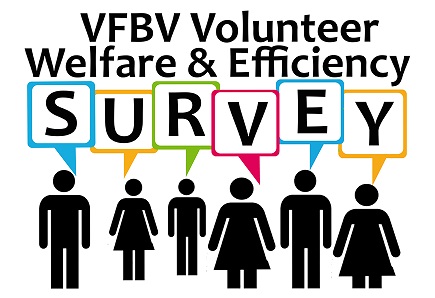
VFBV encourage all volunteers to access and complete the annual VFBV Volunteer Welfare and Efficiency Survey.
This survey is a critical feedback loop and assists us to understand the areas that volunteers want us to advocate for. The results of the survey are public and are presented in detail to Government, EMV and CFA.
The survey will be closing within days. Please visit https://www.vfbv.com.au/cfa to complete the survey today.

Training restrictions easing
Many would be aware that COVID-19 has forced CFA into restricting many activities resulting in training acquisition courses being postponed or cancelled throughout 2020.
It has been positive to learn that following public easing of restrictions, CFA skills acquisition courses can now start with CFA confirming that skills acquisition can go ahead throughout the summer period providing that there is maintained capacity and the training can be done in a COVID-Safe manner.
VFBV welcomes this news and will monitor the situation as we understand that many Brigades are finding that restrictions have created a backlog and the difficulty in being able to upskill members over recent months, especially in vital training such as Breathing Apparatus.
VFBV can also confirm that CFA’s position is that skills acquisition training can continue throughout the Fire Danger Periods with CFA committing to ensuring that Instructors will be made available anywhere in the State when and where required.
State Championship Registration
A reminder of the deadline of 1st February 2021 for preregistration for all attending any of the State Championships being conducted at Mooroopna in March.
This particularly applies to any Brigade team wanting to enter to compete and Brigade members wishing to nominate as a Track Official or Judge. Pre-registration must be completed prior to 1st February.
Due to requirements for a COVID-Safe event, the entry and registration process has changed for all 2021 State Championships as an online process through the Operoo platform, and all attending/ competing/officiating etc at any Championship event at Mooroopna, are required to preregister online at https://tinyurl.com/vfbv-operoo
Competing Brigades, please note the Brigade member who is completing the Brigade’s team entry form, must complete and have processed their own Individual Registration first, following which they will be forwarded the relevant entry forms and information. Members completing Brigade entries will need to allow sufficient time for their own preregistration to be processed before the entry form will be sent to them.
Likewise all members wanting to nominate as a Track Official or Judge need to complete their Individual Registration first, at which time they will be prompted to complete the relevant nomination form ensuring that VFBV know which role/position you are nominating for to ensure you are included on the relevant roster/s.
Any Brigade or member needing assistance with the pre-registration process, please contact the VFBV office 9886 1141 or This email address is being protected from spambots. You need JavaScript enabled to view it., or contact CFA at This email address is being protected from spambots. You need JavaScript enabled to view it.
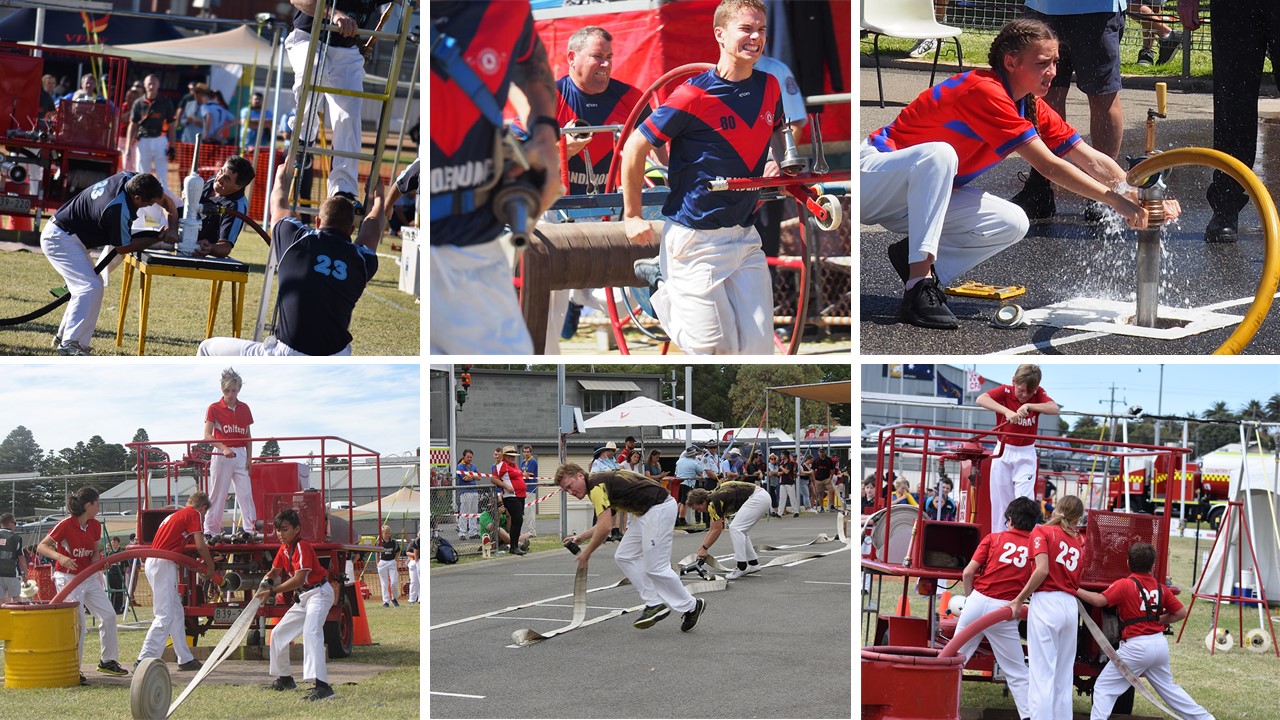
Prototype Pumper Tanker
Members will be pleased to learn that the Prototype Pumper Tanker is close to being completed. COVID 19 restrictions have limited visibility to the build, and resulted in working party members being unable to visit the workshops as it is being built.
In welcome news earlier in December with the easing of COVID restrictions the VFBV delegates to the working party were able to view the near completed appliance at the manufacturers workshop twice before the Christmas break. The interest in this type of appliance from across the state has been positive with many requests being made for brigades and groups to be included in the statewide tour.
For those who are specification driven the Prototype has a 3000 litre water tank, 2500lt per minute hydraulic pump, tank autofill function, luminous handrails for better visibility at night, new control screens and the addition of a TIC mounted in the front bull bar as well as a full suite of battery operated rescue equipment.
CFA has agreed to working party members request to assess the appliance in its operational capabilities through a series of practical tests before it is sent on the statewide tour to brigades and groups to view.
Once finalised locations will be communicated to all districts and it is hoped that as many volunteers as possible can attend a location close to their brigade and give constructive feedback.
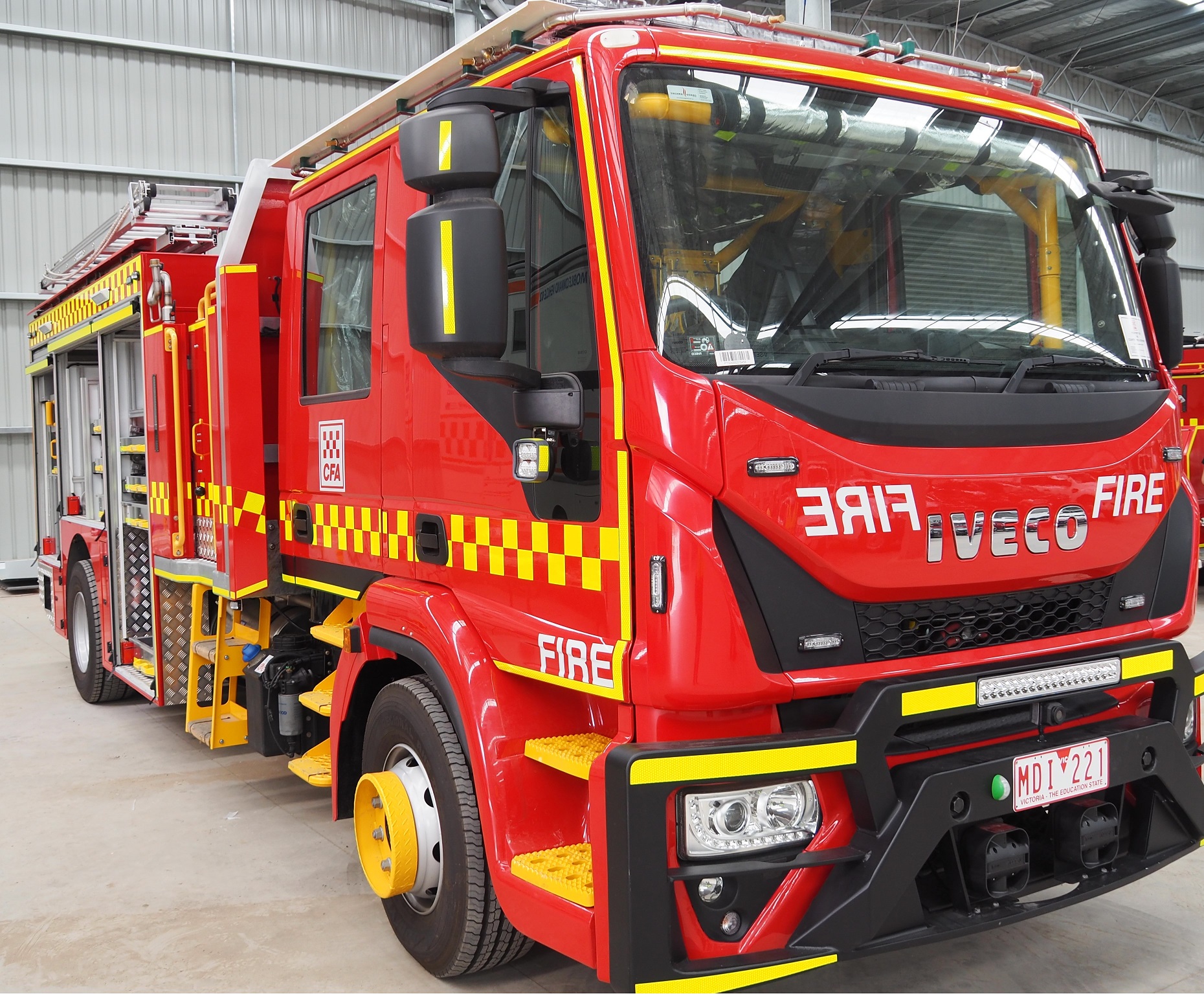
Rescue, EMR Support
VFBV delegates to the Equipment & Infrastructure Committee have strongly supported the call by volunteer rescue brigades from across the state who have been requesting CFA increase its budget to allow for much needed equipment upgrades and specialist response capability.
In welcome news, Committee members were recently informed of some new equipment expected to be rolled out soon. Brigades will see an upgraded battery-operated lighting kit as a part of an aspirational target to remove 240-volt power equipment from appliances to improve safety. The new lighting and other specialist equipment will help to ensure operators have a safer experience when attending rescues. New vehicle designs are progressing as well as continued trials of state-of-the- art equipment.
VFBV has also supported the concerns raised by rescue brigade members who have reported that the directive to discontinue the use of winches has had an impact on the ability of rescue brigades to undertake some critical specialist work. CFA has been asked to provide an outcome that will allow the use of winches to be used safely. While there has been no outcome to date, delegates will continue to pursue.
EMR upgrades are also progressing for volunteer EMR brigades with new and improved defibrillators equipped with single pad technology, Wi-Fi and Bluetooth data transfer built into the unit. Special training defibs, intelligent training mannequins and the creation of a state training cache for defibs and mannequins are progressing well.
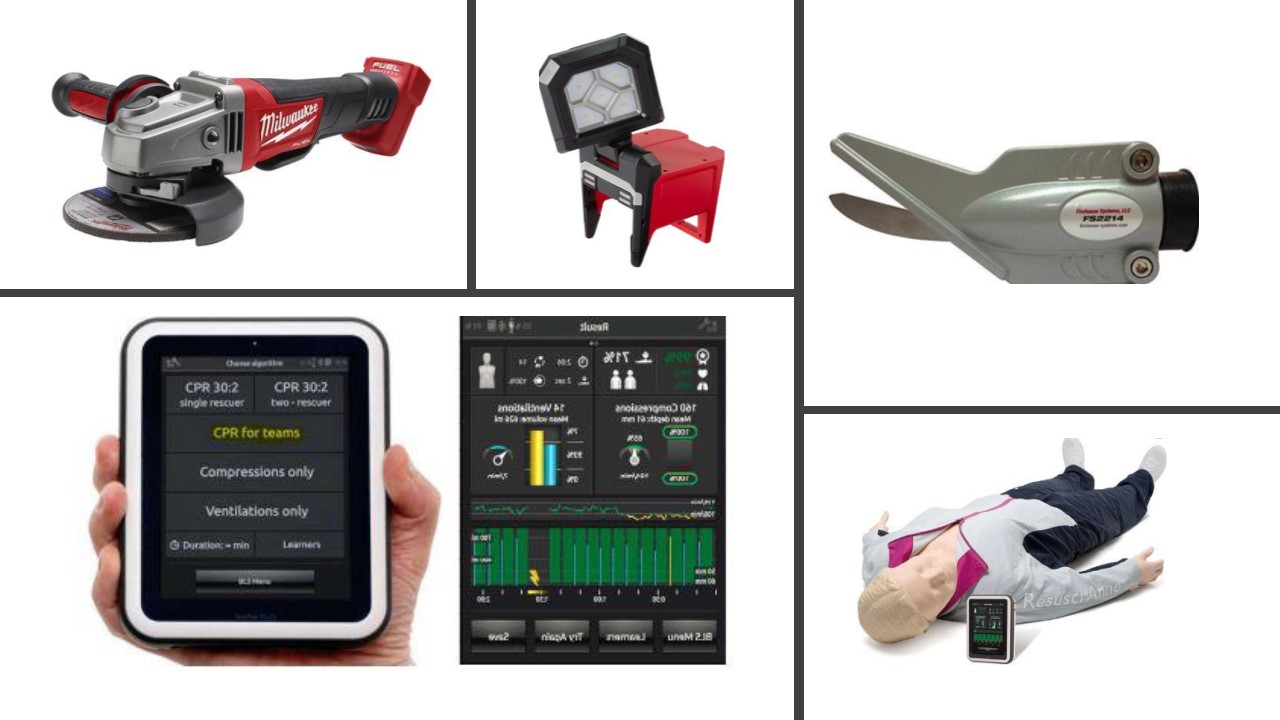
Fire Investigators
Volunteer Fire Investigators are still reporting little to no progress on removing the arbitrary impediments that have been introduced by FRV that limit the use of volunteer fire investigators.
After strong representations by VFBV over the last couple of months, CFA has reported that a ‘status quo’ arrangement is finally in place and volunteer fire investigators can and must be engaged to ensure service delivery is maintained. VFBV continues to point out that volunteer fire investigators undertake the same training and skills maintenance as their FRV counterparts, so there is no legitimate reason why they cannot continue to undertake investigations, and not doing so is clearly discriminating against volunteers.
VFBV will continue to pursue an outcome and will monitor progress.
Commander Vacancies
VFBV continues to raise concerns with the large number of operational positions left vacant through the CFA/FRV secondment arrangements.
VFBV District Councils and Brigades continue to highlight the large gaps in the ability to fill key commander positions, with some districts working through another fire season with commander vacancies and in some instances no commanders at all. This places an unreasonable burden on Brigades and Groups as well as District Offices.
The situation is further exacerbated by some districts having Assistant Chief Fire Officer (ACFO) vacancies and insufficient leave planning resulting in high turnover of people through senior positions during the fire danger period.
VFBV delegates to the Operations Committee have reported they are aware of at least 23 Commander vacancies and six ACFO vacancies arising across the state over recent months and are continuing to raise the concern that FRV are not meeting their legislated obligations to ensure CFA capability and volunteer support is maintained.
While CFA has agreed with these concerns, there has been little evidence of progress being made to rectify it. VFBV will continue to pursue.
2021 State Championships
Urban Juniors
Mooroopna, 20 and 21 March
Urban Seniors
Mooroopna, 27 and 28 March
Rural Seniors
Mooroopna, 27 March
Rural Juniors
Mooroopna, 28 March
Recent Articles on the VFBV website
NOW OPEN – 2020 VFBV Volunteer Welfare & Efficiency Survey
Mooroopna to host all State Championships on consecutive weekends next March
2021 State Championships Registration and Entry Forms
Merry Christmas and Happy New Year
Enjoy the VFBV monthly newsletter?
If you enjoy reading the VFBV newsletter each month, why not share it with your fellow volunteers?
Either share this page with others who may enjoy the articles or encourage other volunteers to sign up to receive their own copy each month here.
2021 State Championships Registration and Entry Forms
Written by VFBVRegistration and entries are now open for all the 2021 State Championships.
- State Urban Junior Championship, 20 & 21 March 2021
- State Urban Senior Championship, 27 & 28 March 2021
- State Rural Senior Championship, 27 March 2021
- State Rural Junior Championship, 28 March 2021
Due to requirements for a COVIDSafe event the entry and registration process has changed for the 2021 championships and will be based online.
For all 2021 State Championships at Mooroopna, anyone attending, competing, officiating is required to pre-register online.
The online CFA/VFBV State Championships Individual Registration form is available here for any of the below roles:
- Brigade members (whether Coach, Captain, Secretary or member) who is completing the brigade’s team/s Entry & Registration Form. Once you have completed your own Individual Registration and indicated that you will be completing the Entry/Registration form for your brigade, you will automatically be emailed the relevant Entry & Registration Form/s and information. Please note entries close 5.00pm Monday 1st February 2021.
- Track Officials and Judges. Once you have completed your own Individual Registration please then complete the following nomination form so that we know which Championship/s you are nominating for and in what role/position to ensure you are included on the relevant roster/s:
- Urban Championships https://groups.operoo.com/public_forms/671721/new
- Rural Championships https://groups.operoo.com/public_forms/671719/new
- Coaches, Junior Leaders and Competitors over 18 years. Parents/Guardians of competitors under 18 years, will be sent a link for a consent form for their children to attend and compete once your team has been registered.
- CFA members, family members, supporters etc. Any children aged under 18 who are not competing can be registered with a parent/guardian.
- CFA and VFBV Staff.
Please note the registration for the Championships is strictly limited to:
- CFA members
- Competitors (over 18 years of age)
- CFA Coaches, Junior Leaders, Secretaries, Officials and Judges (please register ASAP to enable team registrations and entries)
- Partners and significant others
- Immediate family (children, parents, guardians and carers)
- Staff contractors, key suppliers and sponsors
CFA and VFBV are committed to running a safe an enjoyable event for everyone in 2021. It was disappointing to have to cancel the State Urban Senior, State Rural Senior and Junior Championships in 2020, and are planning for all events to proceed again in 2021. The events are due to go ahead for 2021 are subject to Chief Health Officer advice and COVIDSafe plans.
All entries will close at 5pm on Monday 1st February 2021, if you need to make any changes to your entries after this date, please contact either Jayne at This email address is being protected from spambots. You need JavaScript enabled to view it. or Jenni at This email address is being protected from spambots. You need JavaScript enabled to view it.
If you have any problems accessing the online forms please contact either Jenni at the VFBV office via email This email address is being protected from spambots. You need JavaScript enabled to view it. or 03 9886 1141 or Jayne at CFA via email This email address is being protected from spambots. You need JavaScript enabled to view it. or on 0476 660 045. Please note if you have a query, there will be limited response over the Christmas/New Year period however you will receive a response as soon a possible after this time.
COVIDSafe Championships resources
CFA have information on COVIDSafe Championships available on the Intranet (for CFA members) and on the CFA website. These pages will be updated frequently so please visit them to seek the latest advice and guidelines regarding the Championships.
Intranet: https://www.members.cfa.vic.gov.au/mycfa/Show?pageId=Championships
Internet: https://www.cfa.vic.gov.au/about/cfa-vfbv-firefighter-state-championships
More...
Mooroopna to host all State Championships on consecutive weekends next March
Written by VFBVFor the first time in their history, all CFA / VFBV State Championship events are scheduled for the same venue on consecutive weekends in March 2021.
Planning is already well underway for Mooroopna 2021 to ensure the events are run in a COVID safe and child safe manner.
The Junior Urban Championships, which were to be held in Horsham, are now scheduled to be held at the Mooroopna Recreation Reserve in Mooroopna on Saturday 20 and Sunday 21 March.
The Senior Urban, and Senior and Junior Rural Championships will take place on Saturday 27 and Sunday 28 March 2021 at the same venue.
Brigades should start looking for accommodation immediately and make their travel arrangements in a COVID safe way. A list of accommodation is available on the CFA intranet.
More detailed information regarding accommodation and transport will be posted in the Championships section of the CFA intranet in coming weeks and will be updated regularly.
Due to COVID-19 restrictions, both weekend events will be classed as outdoor sporting events for CFA members / families and supporters / contractors / suppliers only.
CFA and VFBV would like to thank Horsham Fire Brigade and their Championships committee for their dedication and hard work in the planning and work done for the 2021 Championships. The Junior Urban Championships were held in Horsham in 2012, 2015 and 2020.
Acting Executive Director, Volunteers and Capability, DCO Peter O’Keefe said COVID-19 means significant changes will have to be made to the way the events are run.
“CFA and VFBV are working closely with the City of Greater Shepparton, the Victorian Department of Health and Human Services and the Chief Health Officer to ensure that the events are approved and can be undertaken in a safe way” he said.
“We are looking forward to making this a great opportunity for CFA members to reconnect after what has been a difficult time for many.”
VFBV CEO Adam Barnett said the decision to hold the Junior Championships in March, and a week prior to the Senior Urban & Senior and Junior Rural championships, is an unprecedented one.
“While this will be the first time all three State Championships have been held on successive weekends, it demonstrates the flexibility and agility that CFA members are renowned for, and how our service constantly adapts to any new challenges put before it.” he said.
“Championship events are an important part of who we are, our traditions and our commitment to firefighter safety. They play an important role in brigade discipline and morale as well as providing a terrific opportunity for members and families to come together to celebrate the incredible work that our volunteers do for their communities throughout the year.”
Further advice will be provided to coaches and teams to support them to hone their skills and teamwork ready for the Championships within current COVID-19 guidance and restrictions.
In the meantime, save these dates in your diary.
• Saturday 20 and Sunday 21 March 2021 - Urban Junior State Championships, Mooroopna Recreation Reserve, Midland Highway, Mooroopna.
• Saturday 27 and Sunday 28 March 2021 - Urban Senior and Rural Senior and Junior State Championships, Mooroopna Recreation Reserve, Midland Highway, Mooroopna.
Embracing Mission Command
By Adam Barnett, VFBV Chief Executive Officer
In last month’s column I referred to CFA’s ‘little red book’ and spoke of the contribution of CFA’s first full-time Chairperson Brigadier Richard Eason. As readers would be aware, I have long advocated a healthy respect for our past, and the fact that history provides context and objectivity to the present and should always inform our future. I love that adage of looking back to lean forward.
This doesn’t mean history or tradition should hold our future hostage, but a healthy respect, understanding and appreciation of our past ensures the hard lessons of our forebears are not wasted, and I often reflect on that old adage that those who don’t know history are doomed to repeat it. This has been particularly front of mind as we tally the significant loss of corporate knowledge leaving CFA over recent years and we embark on yet another ‘change’ journey.
One of the interesting things about the history of the little red book is that, while it is generally admired today, back when it was introduced it was controversial and there was pushback. It took several years for the dust to settle and for the strategies and tactics heavily influence by military doctrine to be accepted as relevant and appropriate for emergency management.
So too with Mission Command. The concept of mission command is not new, and in military terms dates back at least to the 1800s with the modernisation of the Prussian Army.
Mission Command is now widely adopted by the British, American and Australian defence forces to name just a few. Put simply, mission command is a concept of delegated command through clear and unambiguous understanding of the leader’s intent. It is a command and control philosophy that encourages the subordinate to exercise disciplined initiative within the leader’s intent to accomplish the objectives when faced with a dynamic and fast changing situation.
Within military circles, mission command was born from the truism that ‘no plan survives the first contact with the enemy’. This is just as relevant to emergency services as it is to the military.
If Eason was the father of the little red book, then ex- Chief Officer Euan Ferguson AFSM would be considered the father of Mission Command within CFA.
Euan was also responsible for promoting Mission Command to AFAC and its adoption by many fire services across Australia.
I was privileged in early 2011 to be approached early on by Chief Officer Ferguson who was seeking assistance to introduce mission command, and have CFA adapt and adopt it within the organisation’s operational doctrine.
And while early conversations with volunteers provided a broad and diverse level of both doubt and support, Euan did not give up and redoubled his efforts to educate and inform on the benefits to this command philosophy to the organisation.
Slowly it began to garner more and more support, and just as Euan intended, provoked thought, conversation and progression to better, safer and more effective command and control in emergency operations.
I also remember the good-natured ribbing we gave the Chief, who insisted on referring to mission command by its German translation of ‘Auftragstaktik’ emblazoned across the discussion papers. And while we joked that it looked like alphabet soup, I suspected Euan was very deliberately reminding us that this isn’t just some new fangled management speak, but a tried and tested philosophy worthy of our attention and adoption.
Sadly, it was thinking beyond its time. The progress and momentum of adopting mission command, and its direct links to strengthening the role of Group in local command and control arrangements was lost after Euan’s departure as Chief Officer. It is one of the great unfinished legacies we should grieve, and I’d suggest a part of our history that needs to be urgently resuscitated.
One of the reasons I so deeply admired Chief Officer Ferguson’s teachings on mission command was its potential to respect and maximise human creativity, initiative and diligence. At its heart was a philosophy that respected the human condition and acknowledged that doctrine should always enable and guide our response to emergencies - not hinder or frustrate.
When dealing with the criticisms of mission command and working to understand the perspective of its detractors, it was clear that it would take time to teach, embed and understand how the philosophies of mission command could best be adapted to the CFA context. It was widely accepted by Euan that mission command may not be applicable in every situation and has some limitations, but the benefits overwhelmingly outweighed the negatives.
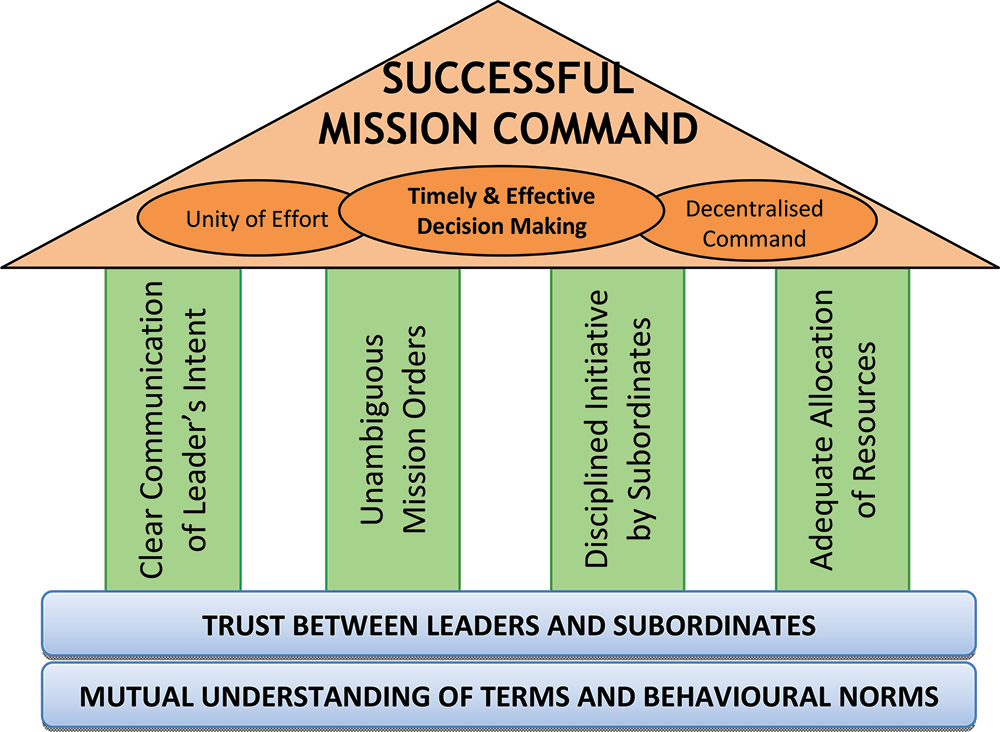
Interestingly, in all discussions there was a recognition that CFA would have to undergo significant culture change to successfully embed the principles of mission command. At its heart, mission command relies upon; decentralised decision making; unity of effort; mutual trust and understanding; clear objectives and leaders’ intent, and timely and effective decision making.
Anyone with any knowledge of CFA processes and systems of work would appreciate instantly some of the cultural improvements we would need to work extra hard at to overcome. One only needs to look at our Standing Orders (SOs) and Standard Operating Procedures (SOPs) to gain an appreciation for the shift required.
Mission command was intended to reduce, simplify and focus SOPs for example, one of the capstone layers of our operational doctrine. Instead, over recent years they continue to grow, not just in number, but in length and complexity. Additions have introduced magnitudes of prescription that couldn’t possibly be expected to survive engagement with the enemy (the fire).
I attended a volunteer forum recently where some joked that one of the few redeeming qualities that our current SOPs provide is the mountains of paper now required to print them all out. The rationale being that there is a forest somewhere in the world that has had some of its fuel load reduced through the printing of today’s paperwork!
So why this trip down memory lane?
Simply put - mission command is just as relevant today as it was in 2011. The culture change required to build respect, trust and unity of effort within CFA I would argue is just as important, if not more important than ever. There are still embers or vestiges of mission command left from its original adoption. The Chief Officer’s annual fire season intent statements are a good example.
And while mission command is most relevant to incidents, and especially large incidents, its concepts, frameworks and key principles are highly suitable and adaptable to local command and our work to strengthen the role of group and empower and trust senior volunteer leaders such as Group Officers, Captains and Lieutenants.
Think of it from a brigade perspective and imagine an organisational culture that respects and trusts each of its brigade leaders and empowers them to work within clearly defined objectives where they can maximise the capacity and capability of each CFA brigade. A brigade with the freedom to shape and reflect each of the diverse and unique communities across Victoria they inhabit, but simultaneously reflects a common set of values, hopes and unity of purpose in putting our communities first and defending and helping them prepare for the ravages of fire and other emergencies all the while making the brigade a satisfying and even enjoyable place to volunteer and work.
And this my friends, is probably why mission command stalled. It isn’t a doctrine or a control system. It most certainly isn’t a world with no rules or a metaphorical free for all. It is a philosophy. One that has been very successfully adapted by organisations much larger than ours, and one that enables a diverse group of people to come together and solve complex tasks.
Most importantly, it puts the human (with all our faults and otherwise) at the centre, empowering and trusting the individual to best solve the problems at hand.
I can think of no better philosophy to embrace as we take these next steps on CFA’s change journey. If we don’t embrace the people part of our organisation and rebuild the trust and respect by the corporate CFA to our brigades and its members, then these changes will be as fleeting as many others.
This is also a reminder that our history teaches us that change is difficult. That shouldn’t stop change from being proposed but should inform boards, executives and leaders of the vital role they play in ensuring change is well articulated, understood and informed by grass roots. We also need to accept change is inevitable.
Only when everyone respects that the journey is just as important as the destination, will people embrace and open their minds to change, and that change will be long lasting.
MERRY CHRISTMAS
May I wish all members and their families a very special Christmas and New Year.
While this year has been long and difficult, CFA and other emergency management volunteers continue to demonstrate their unwavering commitment to the safety of all Victorian’s.
And as we prepare for another fire season and sacrifice precious time with our loved ones in service of our communities, I extend a very genuine thank-you and well done for all your efforts. We are proud of you and wish for everyone a safe and well-deserved break over the holiday period.
But should you be called out please stay safe and know how grateful and appreciative the public are of your efforts.
2020 VolWEl Survey – Have your say today!

The 2020 VFBV Volunteer Welfare and Efficiency Survey is now open for all CFA volunteers to take part.
The survey is an annual snapshot of volunteer opinion that contains 33 questions on issue chosen by CFA volunteers and takes only 10 to 15 minutes to complete. It is a critical tool in monitoring short-and-long-term trends in volunteer opinion and the effectiveness of initiatives aimed at improving CFA volunteer engagement and wellbeing.
As we move through the fire services reform process, it is critically important that all CFA volunteers have an opportunity to provide their views and have their voice heard, participating in the survey gives all CFA volunteers the opportunity to have their say. The results from the survey will help keep VFBV informed and assist in our advocacy on behalf of all CFA volunteers.
Visit the VFBV website to take part or scan the QR code below to take part in the survey today.
If you know of CFA volunteers who do not have internet access, VFBV can post out a copy of the survey for them to complete. Please contact your VFBV Support Officer or the VFBV office This email address is being protected from spambots. You need JavaScript enabled to view it. or (03) 9886 1141 and we will post a copy.

Child Safety Consultation
A reminder that consultation over proposed changes to two CFA policies and one procedure, relating to improving Child Safety are underway.
The draft proposals include a proposed requirement for new members to complete a working with children check as part of their application process when they join. Copies of the draft documents are available for volunteer feedback and review and can be accessed through the VFBV website. VFBV will provide a formal response to CFA after reviewing volunteer feedback. All brigades, groups and individuals are encouraged to contribute to this review and provide feedback.
Feedback is due back to VFBV by 11 January 2021.
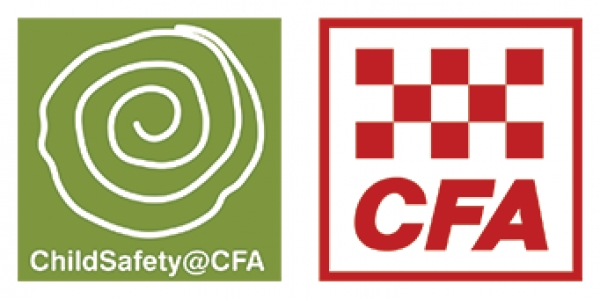
Welfare Fund Deadline
Brigades are reminded that 31st December is the deadline for paying this year’s Welfare Fund subscription. Subscribing ensures your members are protected in the likelihood of needing emergency financial assistance if they find themselves in hardship due to loss of work, family illness or accidental injury.
Under the Welfare Fund Rules if a Brigade fails to pay its Welfare Fund subscription and their membership lapses, there will be a one year waiting period imposed should the brigade decide to re-join in the future.
Therefore, it is incredibly important for the protection of your members, that Welfare Fund subscriptions are kept current with payments received by VFBV before 31st December each year. Please contact your Brigade Secretary to ensure your brigade is up to date.
Last financial year a total of $273,237 in Welfare Fund grants were paid to volunteers in severe financial need across the state, and the support of the Welfare Fund is always gratefully received by brigades, and volunteers in their time of need.
VFBV Quarterly Supplement
Included in the December edition of Fire Wise was the fifth edition of the VFBV Quarterly Supplement.
The Quarterly Supplement contains 16 pages of relevant news, updates and information on current issues being pursued by VFBV on behalf of members. It also includes links to additional resources or updates that are available via our website.
An electronic copy of the Quarterly Supplement can be downloaded here.
Brigade Captains and Secretaries, Group Officers and Group Secretaries as well as VFBV delegates are requested to please take the time to read this and future editions, and to table at your meetings for the benefit and knowledge of your members.
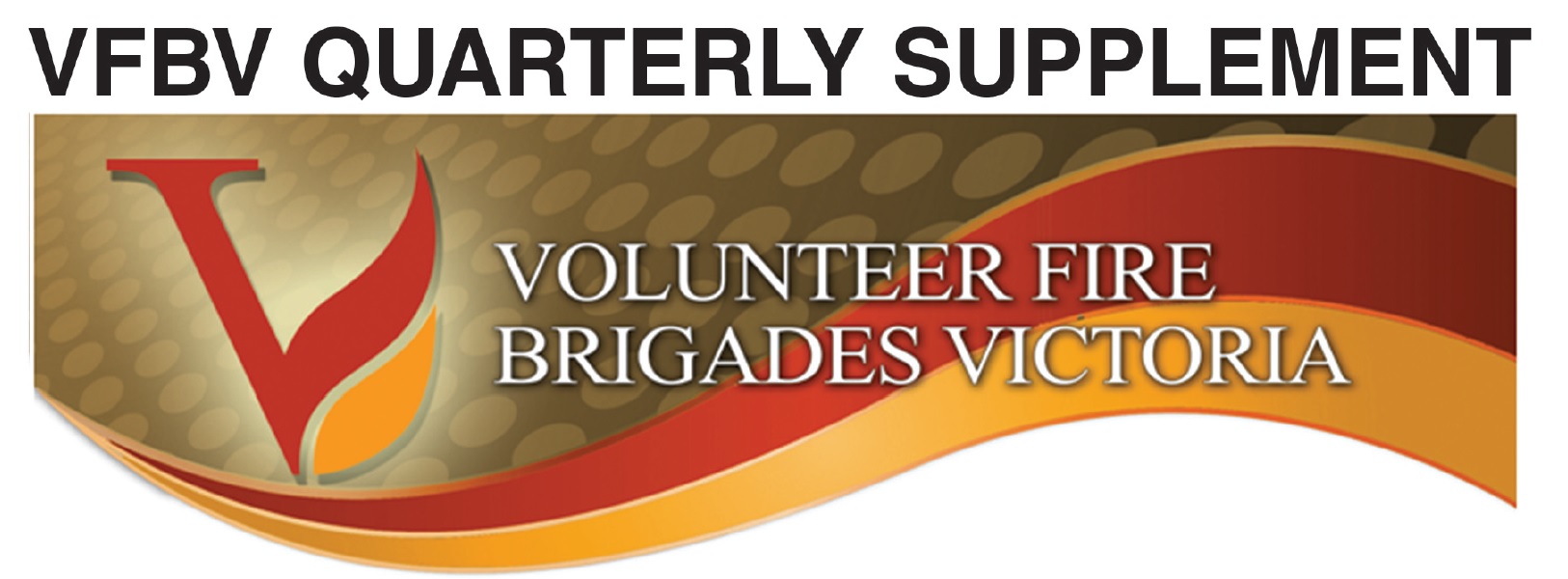
Replacement PPC
Each fire season VFBV deals with a small number of reports that volunteers applying for replacement personal protective clothing (PPC) items have difficulty. State Council has resolved a zero-tolerance approach to these issues and that any member who has been denied replacement PPC are to log the incident in CFA Safe and approach your local District Council who will then escalate with CFA as a matter of priority.
All operational members are entitled to have PPC that is fit for purpose and in good working condition. When approaching District Council, members are requested to have a record of who has denied the request, and as much date and detail information as possible so that appropriate action can be taken. Any rejected applications for replacement PPC should be requested in writing, and best endeavour used to escalate internally for resolution first.
In most cases VFBV officials have been able to resolve the issue quickly and at the local level to the satisfaction of the member involved. Brigade Officers are encouraged to report any instances where members have not been provided appropriate replacement items within reasonable timeframes.
General Firefighter
VFBV delegates to the working party on General Firefighter (GFF) have been happy to see that the program has been prioritised by CFA and is currently being delivered in different parts of the State with mostly positive feedback being received.
CFA has reported that over 800 members are already enrolled in more than 120 registered courses.
VFBV is continuing to work with CFA on the eLearning component of GFF to ensure the flexible and adaptable delivery of the program and has raised concern over expected timeframes. Delegates are still concerned that in some areas Districts have not been pro-active and haven’t been engaging with local volunteer Trainer and/or Assessors when organising much needed courses or engaging with Groups and Brigades to ensure that briefings and handover sessions are being completed and target at cohorts.
VFBV encourages Training officers who are unsure of what GFF is or the lack of courses to please raise this with your local delegate or VFBV District Council so it can be escalated to the Joint Training Committee.
Training Restrictions Easing
Many would be aware that COVID-19 has forced CFA into restricting many activities resulting in training acquisition courses being postponed or cancelled throughout 2020. It has been positive to learn that following public easing of restrictions, CFA skills acquisition courses can now start with CFA confirming that skills acquisition can go ahead throughout the summer period providing that there is maintained capacity and the training can be done in a COVID-Safe manner.
VFBV welcomes this news and will monitor the situation as we understand that many Brigades are finding that restrictions have created a backlog and the difficulty in being able to upskill members over recent months, especially in vital training such as Breathing Apparatus. VFBV can also confirm that CFA’s position is that skills acquisition training can continue throughout the Fire Danger Periods with CFA committing to ensuring that Instructors will be made available anywhere in the State when and where required.
2021 State Championships
Urban Juniors
Mooroopna, 20 and 21 March
Urban Seniors
Mooroopna, 27 and 28 March
Rural Seniors
Mooroopna, 27 March
Rural Juniors
Mooroopna, 28 March
State Junior Championship hosts
Any Brigades/Committees interested in hosting a State Urban Junior Championship during the years 2022 to 2024, are invited to lodge an Expression of Interest to VFBV. VFBV strongly encourages all Brigades/Committees to consider their ability and willingness to host a State Junior Championship to ensure the continuation of our competitions.
Expressions of Interest to be forwarded to This email address is being protected from spambots. You need JavaScript enabled to view it. or faxed to 03 9886 1618 by Friday 29 January 2021.
Any queries or information can be obtained from the VFBV office on 03 9886 1141 or to This email address is being protected from spambots. You need JavaScript enabled to view it.
Independent Advisory Committee - Applications Sought
Earlier this month, the Victorian Liberal/National parties announced the commencement of community consultation to engage directly with CFA volunteers and other key stakeholders in the development of its fire service policies.
As part of this broad consultation, they are establishing an independent CFA Advisory Committee chaired by the former counsel assisting the 2009 Victorian Bushfires Royal Commission and Ex-Supreme Court Judge the honourable Jack Rush QC.
The independent panel will provide recommendations on future policy informed by consultation with volunteers and extensive experience within Victoria’s emergency services. VFBV has been invited to nominate three suitably qualified and experienced CFA volunteers to participate on the independent panel.
In accepting the invitation to participate, the VFBV Board has noted that the panel is independent, all members are participating in a voluntary basis, and the panel sits outside any formal or established political or party frameworks ensuring its independence.
VFBV is apolitical and encourages bipartisanship on all matters involving the fire services. This means on matters that involve legislation and policy we strive to work with all parties and all sides of politics to represent the views, concerns, and aspirations of CFA volunteers. In much the same manner that VFBV participates in Government sponsored panels, committees and working parties, VFBV will consult with any parties that wish to support CFA and CFA volunteers. Our obligation under the Volunteer Charter is to act as the elected representatives of CFA volunteers on all matters which may impact upon them, and this includes future policy development. We have communicated with every sitting Member of Parliament several times this year already.
We are now seeking applications from any CFA volunteer who feels they could positively contribute to the independent advisory committee.
Applications need not be lengthy but should include a current resume (or half page bio), a summary of your CFA experience and achievements that will help you contribute, and a brief letter outlining:
- Rough estimate of the size and reach of your consultative networks
- How you inform yourself of broader CFA volunteer views outside your immediate Brigade
- A brief summary of key issues and topics you feel the Committee should consider
- And any further information you feel is relevant.
Applications should be addressed to:
VFBV
C/- Nominations Panel
9/24 Lakeside Drive
Burwood East VIC 3151
Or via email This email address is being protected from spambots. You need JavaScript enabled to view it.
Applications will close on the 15 January 2020. Further details are available on the VFBV website.
Get Involved
VFBV is the CFA volunteer peak body and the voice for CFA Volunteers enshrined within the CFA Act to advocate and represent volunteers on all and any issues that affect volunteers within CFA. VFBV have multiple structures in place from local level to State level to ensure that your voice is heard.
VFBV encourage all volunteers to access and complete the annual VFBV Volunteer Welfare and Efficiency Survey. This survey is a critical feedback loop and assists us to understand the areas that volunteers want us to advocate for. The results of the survey are public and are presented in detail to Government, EMV and CFA.
This year’s survey will be closing soon. Please visit the VFBV website to complete the survey, or use your phone camera to scan the QR code below to bring it up on your phone or tablet.
We also encourage all Brigades and members to get involved in local VFBV District Council and raise any and all issues that you are facing or ideas on ways to improve CFA. Issues raised or ideas can then be escalated locally or, depending on their nature raised at State Level Committees for advocacy directly with CFA leadership.
For example the VFBV Training Committee has advocated extremely hard on a large number of trainings issues and initiatives over the years and continues to reach positive outcomes with CFA to improve training for Volunteers.
We want to hear your issues and ideas and encourage you to raise these with your local VFBV District Councils in the first instance.

Recent articles on the VFBV website
NOW OPEN – 2020 VFBV Volunteer Welfare & Efficiency Survey
16 Days of Activism Against Gender-Based Violence
COVID-19 Financial Support Resources
Enjoy the VFBV monthly newsletter?
If you enjoy reading the VFBV newsletter each month, why not share it with your fellow volunteers?
Either share this page with others who may enjoy the articles or encourage other volunteers to sign up to receive their own copy each month here.
Independent Advisory Committee - Applications Sought
Written by VFBVEarlier this month, the Victorian Liberal/National parties announced the commencement of community consultation to engage directly with CFA volunteers and other key stakeholders in the development of its fire service policies.
As part of this broad consultation, they are establishing an independent CFA Advisory Committee chaired by the former counsel assisting the 2009 Victorian Bushfires Royal Commission and Ex-Supreme Court Judge the honourable Jack Rush QC.
The independent panel will provide recommendations on future policy informed by consultation with volunteers and extensive experience within Victoria’s emergency services. VFBV has been invited to nominate three suitably qualified and experienced CFA volunteers to participate on the independent panel.
Current members of the panel include:
Jack Rush QC, former Supreme Court Judge and Counsel assisting the 2009 Victorian Bushfires Royal Commission
Craig Lapsley PSM, former Victorian Emergency Management Commissioner
John Peberdy, former member and acting-chair of the CFA Board
Ev Duke, former member of the SES board
Adam Barnett, Chief Executive Officer of Volunteer Fire Brigades Victoria (VFBV)
In accepting the invitation to participate, the VFBV Board has noted that the panel is independent, all members are participating in a voluntary basis, and the panel sits outside any formal or established political or party frameworks ensuring its independence.
VFBV is apolitical and encourages bipartisanship on all matters involving the fire services. This means on matters that involve legislation and policy we strive to work with all parties and all sides of politics to represent the views, concerns, and aspirations of CFA volunteers. In much the same manner that VFBV participates in Government sponsored panels, committees and working parties, VFBV will consult with any parties that wish to support CFA and CFA volunteers. Our obligation under the Volunteer Charter is to act as the elected representatives of CFA volunteers on all matters which may impact upon them, and this includes future policy development. We have communicated with every sitting Member of Parliament several times this year already.
We are now seeking applications from any CFA volunteer who feels they could positively contribute to the independent advisory committee.
Applications need not be lengthy but should include a current resume (or half page bio), a summary of your CFA experience and achievements that will help you contribute, and a brief letter outlining:
- Rough estimate of the size and reach of your consultative networks
- How you inform yourself of broader CFA volunteer views outside your immediate Brigade
- A brief summary of key issues and topics you feel the Committee should consider
- And any further information you feel is relevant
Applications should be addressed to:
VFBV
C/- Nominations Panel
9/24 Lakeside Drive
Burwood East VIC 3151
Or via email This email address is being protected from spambots. You need JavaScript enabled to view it.
Applications will close on the 15 January 2020.
International Volunteer Day is held each year on 5 December, as a chance for volunteers and organisations to celebrate their efforts, share their values and promote their work. International Volunteer Day is mandated by the United Nations General Assembly.
The 2020 theme for International Volunteer Day is Together We Can Through Volunteering. This theme is designed to highlight the impact and value of volunteers during 2020 while also dealing with the impact of the COVID-19 pandemic on both their personal lives and their volunteering experience.
CFA volunteers have demonstrated how well they can adapt to change over the years, and in 2020 they have shown this more than ever. From the devastating 2019/20 fire season, to adapting to changes required due to COVID-19 restrictions, moving to online meetings and training, implementing new protocols, ensuring that CFA was still available to respond to emergencies when called upon and preparing for the upcoming fire season. This year CFA volunteers have shown that Together We Can Through Volunteering to ensure that their communities are protected 24 hours a day seven days a week.
Volunteer Fire Brigades Victoria (VFBV) CEO Adam Barnett said the extraordinary summer fires across Victoria and eastern Australia earlier in the year highlighted the invaluable contribution of CFA volunteers.
“Our volunteers rose to meet this challenge both locally and across the country,” Mr Barnett said.
“The coronavirus has changed the way we live in recent months, but we shouldn’t forget the massive effort of volunteer firefighters not only last summer and the next - but every day of the year.”
This past summer was one of the most challenging ever for CFA volunteers who played critically important roles in New South Wales and Queensland as well as their home state.
“Our volunteers individually show great courage, ingenuity, stamina and compassion, while collectively they have the agility, expertise and experience to tackle the most daunting challenges.
“The culture of dedicated and selfless service is a proud Australian tradition. Every CFA volunteer deserves thanks and recognition for the work they do in building community resilience for a safer Victoria.
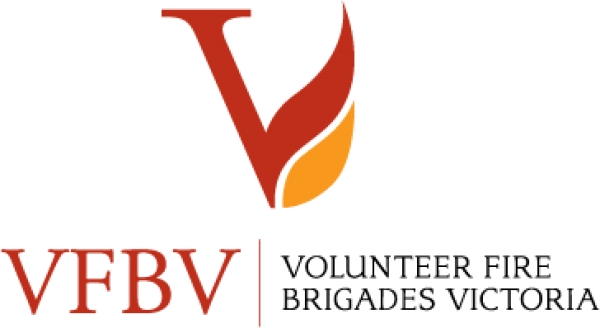 |
About VFBV: VFBV is established under the Country Fire Authority Act and is the peak body for CFA Volunteers in Victoria. VFBV works tirelessly to represent, advocate and support CFA volunteers to the CFA Board and management, governments, ministers, members of parliament, councils, instrumentalities, business and the public. Our vision is for Strong Volunteerism, Embraced to Build Community Resilience for a Safer Victoria. |
 Member Services
Member Services 





